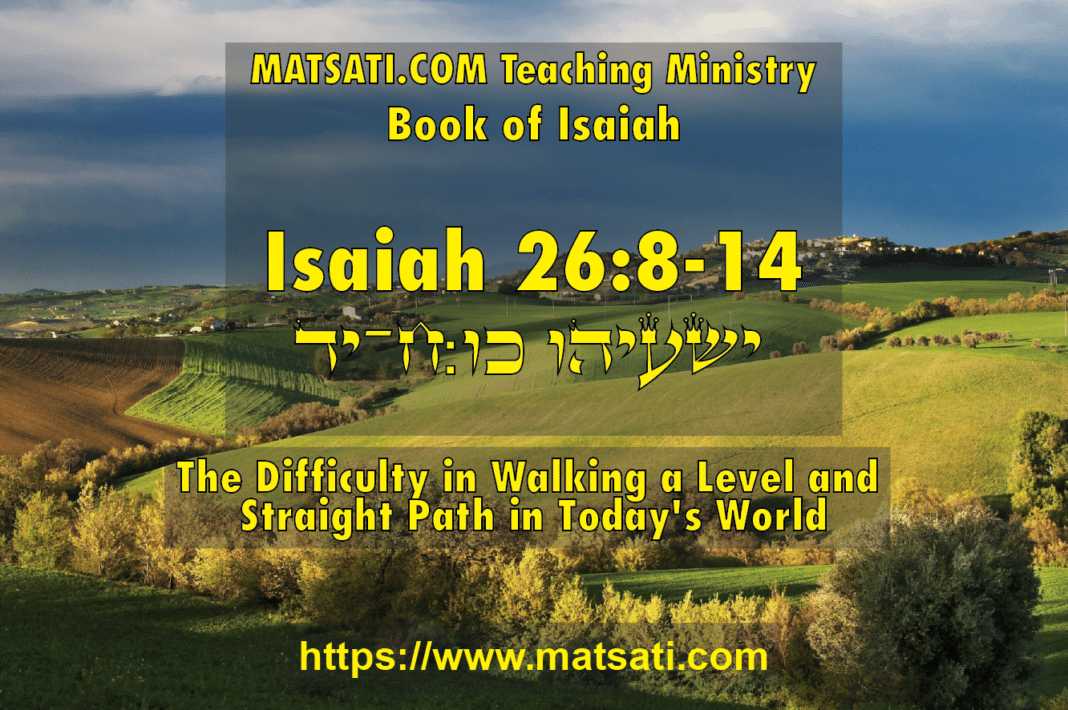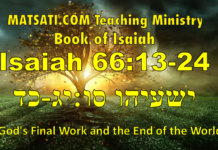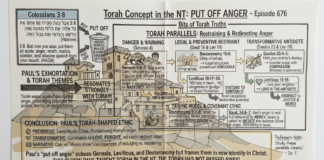Isaiah 26:8-14
As we continue through Isaiah, chapter 26 continues to not utilize the standard elements of poetic literature. Various commentators point this aspect out saying that the meter is missing in the poem of Isaiah. The greatest aspect of Isaiah’s words here in Isaiah 26 is that the Lord God Almighty works powerfully in the lives of His people. And as the Lord works to save and to draw back men to Torah, the people learn what it means to live righteous lives according to God’s Holy Word. The question then arises for our modern times, “Does God still perform miracles in today’s world?” Or “are miracles something that were limited to biblical times?” This is a really good question. The biblical use of miracle is an action of God that produces a result apart from natural means, for example, the crossing of the Red Sea as if on dry land, feeding a multitude with manna from heaven, water from a rock to provide drink for a nation, etc. These are a few examples from the Torah, where clearly the Lord God used something that was very unusual to save His people. The reason people ask this question about miracles is that there is a distinct lack of these things today. Dispensationalists propose that God has functioned in different ways in the Bible, stating that there was an age under Law and now we are in the age of Grace. This theology has had a serious and significant effect upon the faith of people today and leads to a lack of faith that God is able to do these things today! Dispensationalism can be taken to various levels of extremism in regard to how God’s word applies to us today. For example, there are Churches all over the world who ascribe to the teachings of Dispensationalism and in fact teach that God doesn’t heal, and the gifts of the spirit do not operate, only love remains. In addition to this, dispensationalists propose the idea that man earned his salvation under the Law, and now in Jesus we have grace and don’t have to earn our salvation. This is utterly a false doctrine based upon misunderstanding the Scriptures. For example, if we look at the Exodus, God delivered the people, brought them through the sea, performed many miracles, food, water, bread, meat, and then brought them before the mountain of Sinai. Then in Shemot / Exodus 19 when the people arrived at Sinai, the people entered into a covenant with God by faith. It was then and only then, after they were in a covenant with God, did the Lord God give them His Torah (instructions), so they could live as a holy and righteous people, who are “already” in a covenant by faith. This is the result of the mercy and grace of God, which is displayed in the Tanakh, all the way back to Adam and Eve where God performed the first sacrifice for them, providing skins for them. The concept of grace through faith follows through to Yeshua today from right out of the pages of the Torah of God, where even the gentiles by faith can believe and be saved! Note in the Exodus story, it says that there was a mixed multitude that was delivered from Egypt, that is Jew and gentile (non-Jew) which is then paralleled and fulfilled in Yeshua. Dispensationalists do not grasp these truths that jump out at us from the pages of the Scriptures.
There may also be an additional aspect of faith that may be leading to why one does not see miracles of God today in his or her life. This is related to having the proper Kavanah, and to holiness. In today’s terminology, “holiness” has become an ethical category which is related to morality. This understanding of holiness in terms of morality is a modern shift from the ancient Hebrew definition for holiness. The Torah based meaning of “holy” (קדושׁ, qadosh) is set apart or separated. There are related Torah based concepts such as טהור (“clean,” tahor) and טמא (“unclean,” tame). These terms have also undergone a modern moralization, but these ideas too have more to do with separation than with either sin or salvation. Moshe used these terms to illustrate how the things we do in life are connected to our relationship with God in heaven. This is illustrated in what Moshe says according to the opening verses in פרשת קדושים Parashat Kedoshim.
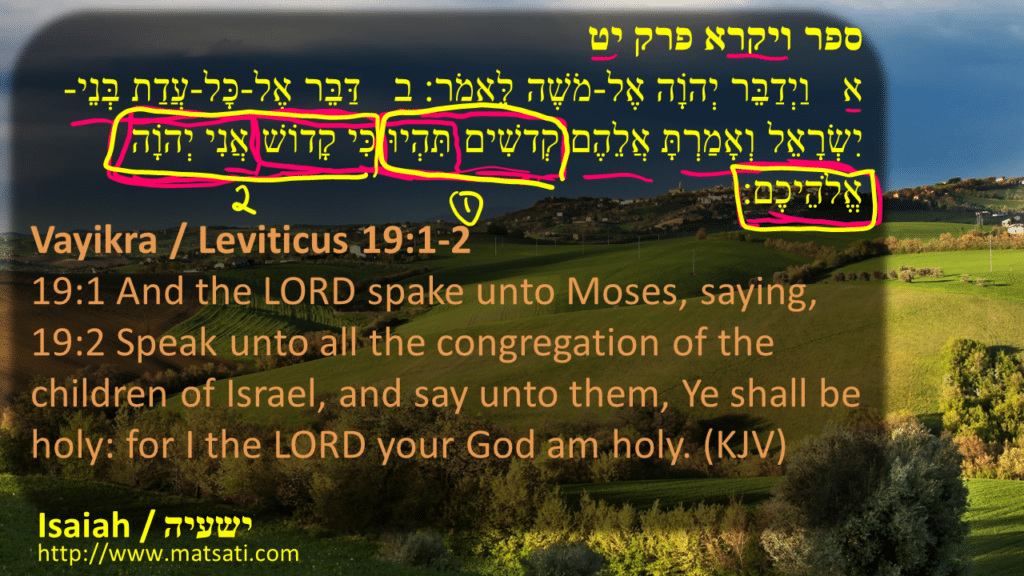
ספר ויקרא פרק יט
א וַיְדַבֵּר יְהוָֹה אֶל-מֹשֶׁה לֵּאמֹר: ב דַּבֵּר אֶל-כָּל-עֲדַת בְּנֵי-יִשְֹרָאֵל וְאָמַרְתָּ אֲלֵהֶם קְדשִׁים תִּהְיוּ כִּי קָדוֹשׁ אֲנִי יְהוָֹה אֱלֹהֵיכֶם:
Vayikra / Leviticus 19:1-2
19:1 And the LORD spake unto Moses, saying, 19:2 Speak unto all the congregation of the children of Israel, and say unto them, Ye shall be holy: for I the LORD your God am holy. (KJV)
We note here that God told Moshe to tell the people, קְדשִׁים תִּהְיוּ כִּי קָדוֹשׁ אֲנִי יְהוָֹה אֱלֹהֵיכֶם “holy you are to be because I the Lord your God am holy.” Connected to this we note that the Masorets identified the middle of the Torah fell upon Vayikra / Leviticus 8:8
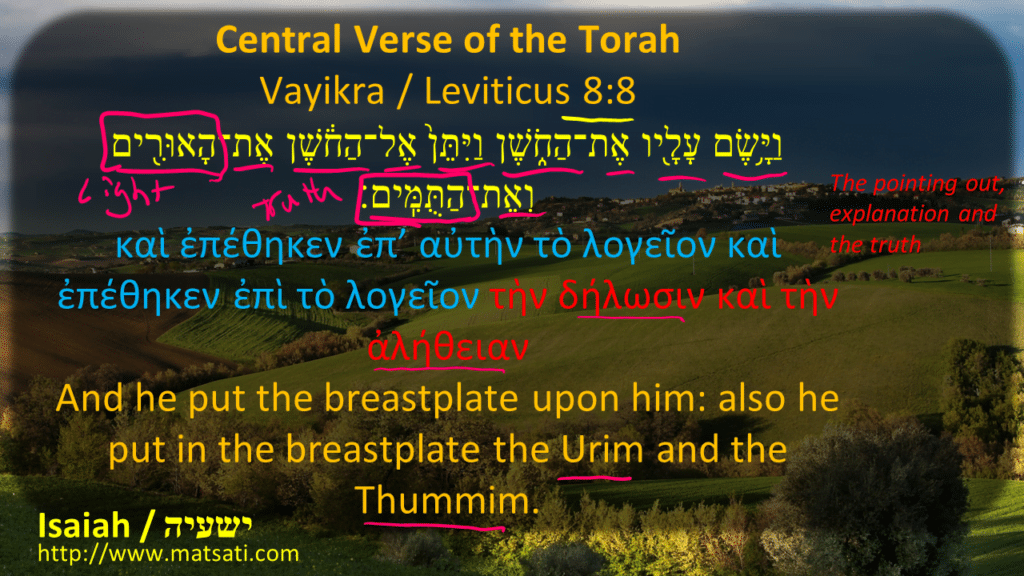
וַיָּ֥שֶׂם עָלָ֖יו אֶת־הַחֹ֑שֶׁן וַיִּתֵּן֙ אֶל־הַחֹ֔שֶׁן אֶת־הָאוּרִ֖ים וְאֶת־הַתֻּמִּֽים׃
καὶ ἐπέθηκεν ἐπʼ αὐτὴν τὸ λογεῖον καὶ ἐπέθηκεν ἐπὶ τὸ λογεῖον τὴν δήλωσιν καὶ τὴν ἀλήθειαν,
And he put the breastplate upon him: also he put in the breastplate the Urim and the Thummim.
We note that the אוּרִים, urim / תֻּמִים, tumim are the objects that were put in the breastpiece of the Cohen HaGadol (High Priest) to discern the will of God. We also note that the The Urim and Thummim are mentioned in the Tanakh but we are never given a description as to their exact function, this is unclear. The descriptions of Aaron’s vestments place the Urim and Thummim inside the “breastpiece of judgment” which Aaron wears over the ephod, so the idea is that these must have been fairly small (see Shemot / Exodus 28:30, Vayikra / Leviticus 8:8). The idea is that these were a pair of objects whose function was unknown. There are various rabbinic stories on how these things functioned, but the point is for the discussion of there being no seeing of miracles. If we look at these Hebrew words אוּרִים and תֻּמִים we note that these words mean “light” and “innocence” used as nouns and written in the masculine plural absolute form. We note how this draws us back to Kavanah, having the proper intention, going before God and men in innocence (תֻּמִים) with a pure heart. The light represents righteousness and connects back to the same thing, the intention and purity of heart and mind. When we seek a miracle from God, do we go with the purest intentions? When we pray to the Lord God our Father in heaven, do we pray with the purest intentions? The key aspect of righteousness, holiness, and innocence, deals with our relationship with God. If we are drawing near to this world, we note how the darkness of this world has a polluting function in our lives making us טמא / unclean. When Isaiah said in Isaiah 26:7 אֹרַח לַצַּדִּיק מֵישָׁרִים יָשָׁר מַעְגַּל צַדִּיק תְּפַלֵּס “The way of the just is uprightness: thou, most upright, dost weigh the path of the just.” He was providing an image of the feet of the poor and needy and the road upon which they walk. This is the path of truth and righteousness (אֹרַח לַצַּדִּיק מֵישָׁרִים). The question then is for us, do we walk the path of truth and righteousness? Or do we fill our minds with all sorts of unholiness and godlessness from this world through television and entertainment industries? Is our focus upon the Lord and His Messiah Yeshua, or are we more focused upon this world, money, and material things? These things have a serious impact upon whether we hear from the Lord or not, and the reason is based upon what David wrote according to His psalm, Tehillim / Psalms 66:18.

ספר תהילים פרק סו
יח אָוֶן אִם-רָאִיתִי בְלִבִּי לֹא יִשְׁמַע | אֲדֹנָי:
Tehillim / Psalm 66:18
66:18 If I regard iniquity in my heart, The Lord will not hear me: (KJV)
It is important to note that in this world, it is difficult to walk a level and straight path. This requires a great amount of effort along with the help of God in heaven. The Lord does help us, but this does not mean walking in truth and righteousness comes without much effort. We note that the Lord God is not crooked or twisted, he is upright in character, and He has told us what he expects of us, to strive for righteousness and truth, for purity and innocence. This is not to say that these things are easy, in fact, Paul wrote how difficult these things become once we seek to overcome the desires of this world and the flesh according to Romans 6. We note that this world looks towards illicit pleasures, to be deceptive, to walk in pride and places much value on material things. We also note the outcome of these things, and the outcome of those who seek these things. The drawing near to sin and its pleasures, may be why fewer miracles are seen in the lives of those who say they believe and teach that the miraculous power of God is not for today. God’s people on the other hand have much to be excited about. HaShem is showing us through these things how when we pray, we can expect something to happen if we are living our lives in the way that God seeks for us to live! This deals explicitly with Kavanah, having the right intention, of being humble, and having an innocent heart / mind in our approach, to seek truth, and to turn from evil! This does not mean that we do not struggle in life, and certainly we are not perfect. It is the effort that God is looking for, the wanting of more of Him and less of ourselves! This longing for the Lord God and His ways is how Yeshua describes His people according to the beatitudes in Matthew 5:1-12. When we seek for something from the Lord, a miracle, are we also seeking Him and His presence in our lives, such that we might live our lives bearing His testimonies for the single purpose of bringing glory to His holy Name? Note Kavanah, what is your true intention? We note that the Lord calls us to personal sanctity and separation, this was the point of Vayikra / Leviticus 19:2. In addition, the sacrificial system was designed for God’s people so they could draw near to the Lord. This drawing near has the underlying concept of holiness (separation) since drawing near to God requires separation from this profane world and its habitual uncleanness. The call to holiness is therefore the call to wake up and to come alive to God’s presence in our lives!
Isaiah goes on saying the following according to Isaiah 26:8.
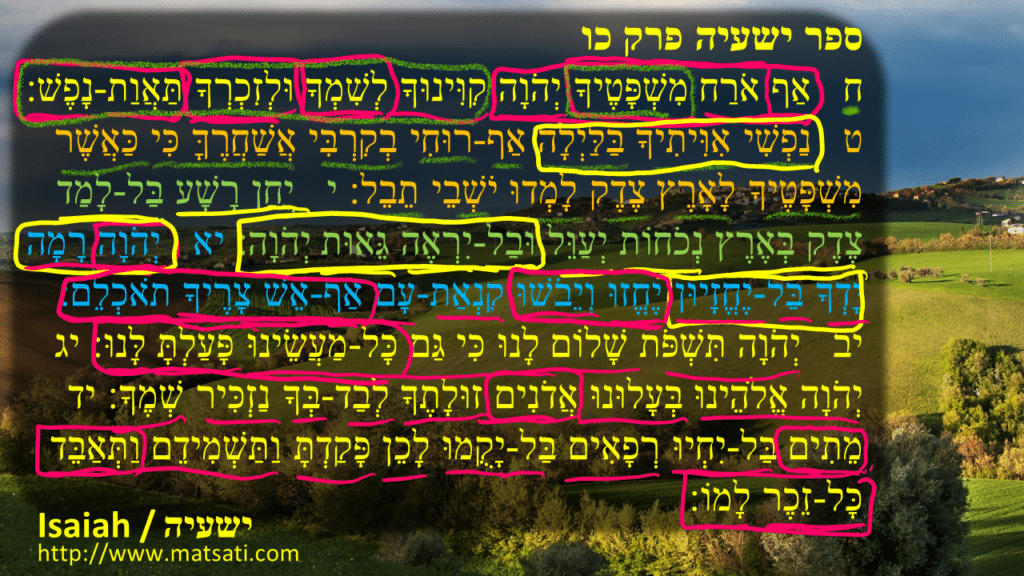
ספר ישעיה פרק כו
ח אַף אֹרַח מִשְׁפָּטֶיךָ יְהֹוָה קִוִּינוּךָ לְשִׁמְךָ וּלְזִכְרְךָ תַּאֲוַת-נָפֶשׁ:
Isaiah 26:8 states, “Yea, in the way of thy judgments, O LORD, have we waited for thee; the desire of our soul is to thy name, and to the remembrance of thee. (אַף אֹרַח מִשְׁפָּטֶיךָ יְהֹוָה קִוִּינוּךָ לְשִׁמְךָ וּלְזִכְרְךָ תַּאֲוַת-נָפֶשׁ)” Liberal Christians tend to hold on to a number of falacies to justify their spin on the Scriptures. This generally begins with the issue of creating God after one’s own image, as opposed to believing what the Scriptures say concerning who God is. The second problem is not having read the bible in its entirety beginning to end every year. This leads to a distinct lack of knowledge about the bible. The reason these things are important to think about is concerning what we read here in Isaiah 26:8 which states אַף אֹרַח מִשְׁפָּטֶיךָ יְהֹוָה “even the paths of your judgments Lord.” When we perform a text comparison, we see the following:

Here the Greek translation (LXX) is straightforward in the interpretation saying, ἡ γὰρ ὁδὸς κυρίου κρίσις, ἠλπίσαμεν ἐπὶ τῷ ὀνόματί σου καὶ ἐπὶ τῇ μνείᾳ, “8 For the path of the Lord is judgment; we hoped in your name and in the remembrance.” We note that the Greek word ὁδὸς maps back to the Hebrew word אֹרַח meaning “path, way, manner, behavior.” The Greek word ὁδός has the sense of meaning “way, road, highway, journey, way of life” and in the LXX ὁδός occurs over 850×. Although the term is used to render many Hebrew terms in isolated instances, it is most commonly the translation of the word דֶּרֶךְ (600×, i.e. Bereshit / Genesis 3:24, etc.); the next most frequent equivalent is אֹרַח (used 35×, i.e. Judges 5:6 etc.). The idea portrayed by the LXX translation causes heartburn for liberals, to say that the way of God is judgment, from the sense of the NT descriptions of who God is, merciful, loving, etc. It is interesting when we study the word מִשְׁפָּטֶיךָ we learn that mishpat משפט is also used to translate “justice” from the sense of making a proper judgment. In the Septuagint, the verb εὐοδόω means “to lead the way well” and this occurs 70x in the Tanakh mainly for the word צלח meaning “success or succeed.” The idea here is what we read in Bereshit / Genesis 24:27 which states, εὐόδωκεν κύριος τὴν ὁδὸν αὐτοῦ, “the Lord led his way successfully” or “the Lord made his journey prosper.” The ὁδὸς / path that God leads us upon is successful because it is rooted or founded in justice and truth! Other uses of the word ὁδὸς for example the noun ἔξοδος occurs 70×, in the case of the exodus from Egypt (Shemot / Exodus 19:1 and 1 Kings 6:1). The word εἴσοδος occurs 50× from the sense “coming and going” (see 1 Samuel 29:6, Tehillim / Psalms 121:8). The verb ὁδηγέω occurs over 40× always with reference to God’s leading. The point of these occurrences is related to our understanding of what this verse is trying to say, that God’s ways are judgment, they are justice and truth, they are perfect for leading us in the way, to avoid sin and glorify God by how we live our lives. The word ὁδὸς is burned into the memory of God’s people as God leading his people by a way, a way out of Egypt, a way out of bondage to sin, a way out of our old habitual paths, to a smooth and straight path filled with peace, and life! This verse draws on the idea that God wants to walk alongside us in life, to guide us in righteousness and truth! The goal of the way of God is to draw near, to dwell with God, to have Him in our lives, in our hearts, and upon our minds always. We walk in the way of God as this brings blessing, the blessing of peace and truth and of power to overcome this world! Isaiah writes קִוִּינוּךָ לְשִׁמְךָ וּלְזִכְרְךָ תַּאֲוַת-נָפֶשׁ “your hope for your name and for the remembrance of you is the desire of my soul.” This demonstrates the faithfulness of God’s people to hope for Him and leads to our understanding that we cannot save ourselves, we need the Lord. This hope illustrates how waiting upon the Lord builds the anticipation of what God is going to do in our lives! We note the Torah imperative for God’s people, the Lord God his paths are judgment, and for those who love Him, they will keep His commands. For those who do not love Him, they will be disobedient! Those who keep the commands of God listen to the voice of God. Note searching the LXX we get the following references to listening to the voice of the Lord your God.
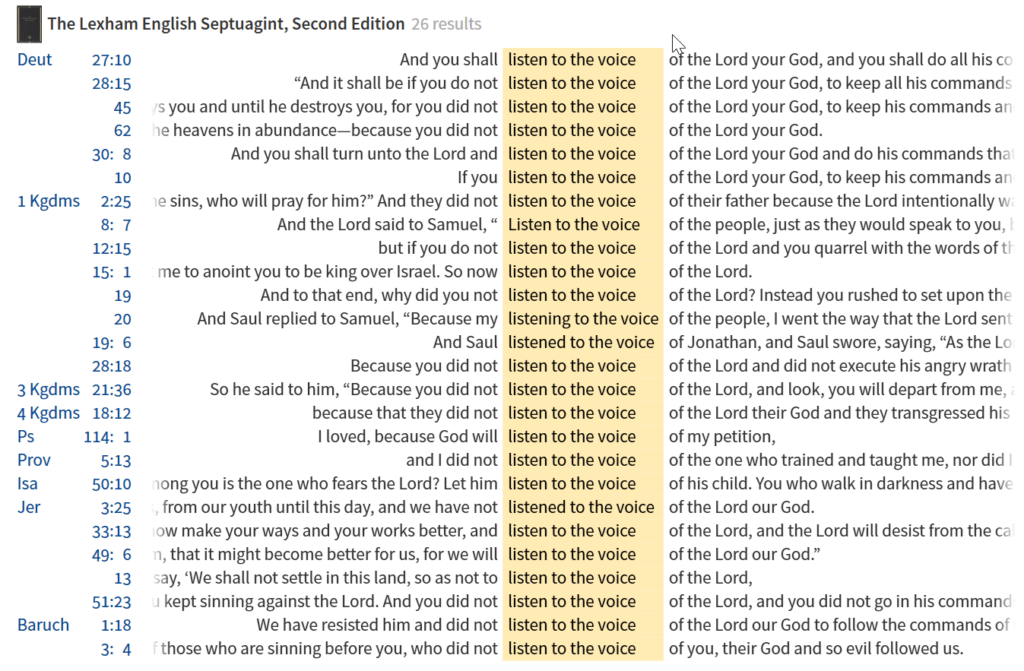
A survey of this statement וְשָׁמַעְתָּ בְּקוֹל “listen to the voice” turns up a number of references, ranging from the command to obey, to the consequences for not listening. Destruction, the curse, the judgment comes as a result of not listening to the Lord God in heaven. The point of judgment on God’s people was for their repentance and turning from sin. The two locations for these things in the Torah are found according to Devarim / Deuteronomy 27:10 and 28:15.
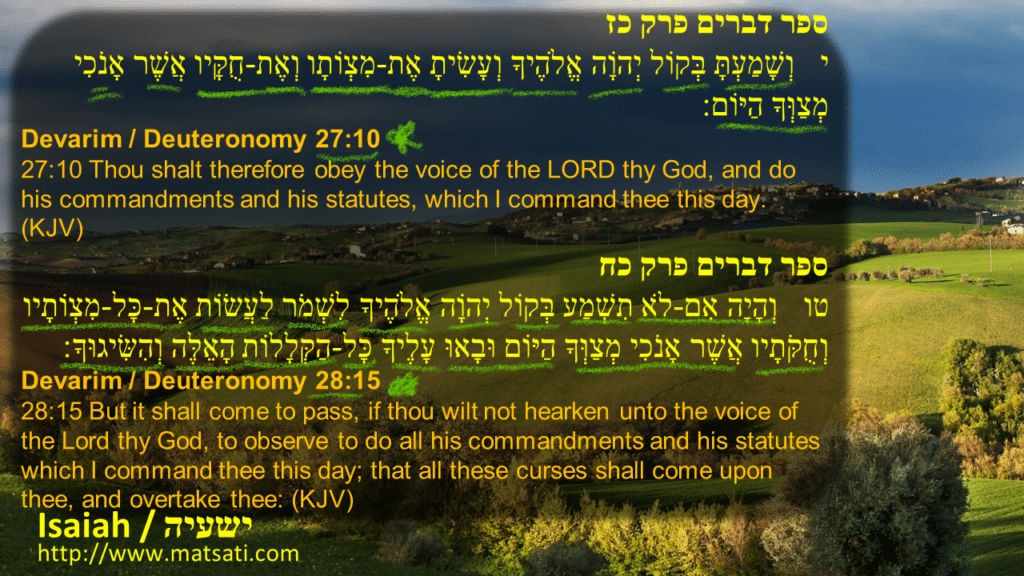
ספר דברים פרק כז
י וְשָׁמַעְתָּ בְּקוֹל יְהוָֹה אֱלֹהֶיךָ וְעָשִֹיתָ אֶת-מִצְוֹתָו וְאֶת-חֻקָּיו אֲשֶׁר אָנֹכִי מְצַוְּךָ הַיּוֹם:
Devarim / Deuteronomy 27:10
27:10 Thou shalt therefore obey the voice of the LORD thy God, and do his commandments and his statutes, which I command thee this day. (KJV)
ספר דברים פרק כח
טו וְהָיָה אִם-לֹא תִשְׁמַע בְּקוֹל יְהוָֹה אֱלֹהֶיךָ לִשְׁמֹר לַעֲשֹוֹת אֶת-כָּל-מִצְוֹתָיו וְחֻקֹּתָיו אֲשֶׁר אָנֹכִי מְצַוְּךָ הַיּוֹם וּבָאוּ עָלֶיךָ כָּל-הַקְּלָלוֹת הָאֵלֶּה וְהִשִּׂיגוּךָ:
Devarim / Deuteronomy 28:15
28:15 But it shall come to pass, if thou wilt not hearken unto the voice of the Lord thy God, to observe to do all his commandments and his statutes which I command thee this day; that all these curses shall come upon thee, and overtake thee: (KJV)
We note that when we consider the NT text, and Paul’s exposition upon the Torah commands (see Romans 6) Paul emphasizes the issue of our inability to obey. This is where the text of Isaiah 26:8 comes into context, that waiting upon the Lord, seeking God and His Salvation is the only way for our salvation. The NT context expresses the great love of God for His people, that He sent His Son Yeshua to die for our sins. This concept of bearing the sins of the people is a Torah centric principle found in the priesthood, and the daily sacrifice. The point is when we are actively seeking to overcome sin, when we are grieved over our sins, and we seek the Lord God in heaven, and his ὁδὸς / ways, the Lord is faithful, and the curses that are spoken of in the Torah will not come upon us. If we however are rebellious to turn from God’s holy ways, to turn from the Torah is synonymous to turning from the Lord God Himself! We have seen from Scripture and even the DSS how this is true. The Torah contains many mighty acts of God, of both judgment and blessing for His people! We recognize that our deliverer is the one who performs these things, and because of these things we cry out to God in heaven in the name of His Messiah Yeshua, for forgiveness, and help to overcome this world. The Lord is faithful to answer us, and to fellowship with us if we are willing, and to bring deliverance and empowerment in our lives, because He desires to walk alongside us in our daily lives! This is the awesomeness of the God who loves us, a personal loving God who also longs for us to draw near!
Isaiah goes on saying the following according to Isaiah 26:9.
ספר ישעיה פרק כו
ט נַפְשִׁי אִוִּיתִיךָ בַּלַּיְלָה אַף-רוּחִי בְקִרְבִּי אֲשַׁחֲרֶךָּ כִּי כַּאֲשֶׁר מִשְׁפָּטֶיךָ לָאָרֶץ צֶדֶק לָמְדוּ יֹשְׁבֵי תֵבֵל:
Isaiah 26:9 states, “With my soul have I desired thee in the night; (נַפְשִׁי אִוִּיתִיךָ בַּלַּיְלָה) yea, with my spirit within me will I seek thee early: for when thy judgments are in the earth, the inhabitants of the world will learn righteousness. (אַף-רוּחִי בְקִרְבִּי אֲשַׁחֲרֶךָּ כִּי כַּאֲשֶׁר מִשְׁפָּטֶיךָ לָאָרֶץ צֶדֶק לָמְדוּ יֹשְׁבֵי תֵבֵל)” Isaiah follows through explaining נַפְשִׁי אִוִּיתִיךָ בַּלַּיְלָה “With my soul have I desired thee in the night,” which is a description of those who truly love the Lord, who desire to draw near and to have God’s presence always. Here Isaiah speaks of the purpose of the judgments of God, that the inhabitants of the earth will learn what righteousness is. The reason being, when man is left to Himself, he follows the Yetzer Hara (Evil Inclination) and sets aside the Yetzer Hatov (Good Inclination). The LXX translates this in the following way:
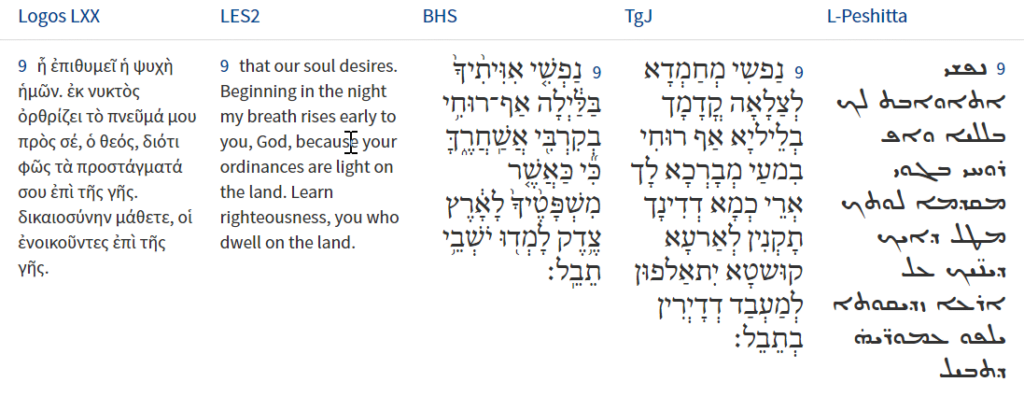
The LXX states ἧ ἐπιθυμεῖ ἡ ψυχὴ ἡμῶν. ἐκ νυκτὸς ὀρθρίζει τὸ πνεῦμά μου πρὸς σέ, ὁ θεός, διότι φῶς τὰ προστάγματά σου ἐπὶ τῆς γῆς. δικαιοσύνην μάθετε, οἱ ἐνοικοῦντες ἐπὶ τῆς γῆς “9 that our soul desires. Beginning in the night my breath rises early to you, God, because your ordinances are light on the land. Learn righteousness, you who dwell on the land.” We note that the Greek word προστάγματά is from the root τασσω tassō meaning “appoint, arrange, put in order.” This reveals to us how the commands of God put our lives in order, and this is the word that is used to mapping back to the MSS מִשְׁפָּט “judgment” which is coupled to the concept of justice and truth. The point being made in the προστάγματά ordinances or commands of God, is that of ordering our lives, bringing order to our lives so that we can have life and live in peace and truth. The emphasis is on the wicked learning righteousness and recognizing the need for repentance and to having faith in the living God. The divine judgments are purposed to help mankind recognize the folly of his ways (see Tehillim / Psalms 78:34) The idea is that if one’s ways are easy and prosperous, there is no reason to turn from wickedness to righteousness. This again is the point of the judgments that are spoken of in Isaiah 26:8, ἡ γὰρ ὁδὸς κυρίου κρίσις, ἠλπίσαμεν ἐπὶ τῷ ὀνόματί σου καὶ ἐπὶ τῇ μνείᾳ, “8 For the path of the Lord is judgment; we hoped in your name and in the remembrance.” These judgments convey the idea that God is drawing all men to faith. The Lord God established Israel in the land as a holy, righteousness, and just, people in the midst of the surrounding nations. The people of God are to be a light to the world, to lead the way in God’s truths so that the world will learn about the righteousness of God.
Isaiah continues saying the following according to Isaiah 26:10.
ספר ישעיה פרק כו
י יֻחַן רָשָׁע בַּל-לָמַד צֶדֶק בְּאֶרֶץ נְכֹחוֹת יְעַוֵּל וּבַל-יִרְאֶה גֵּאוּת יְהֹוָה:
Isaiah 26:10 states, “Let favor be shewed to the wicked, yet will he not learn righteousness: in the land of uprightness will he deal unjustly, and will not behold the majesty of the LORD. (יֻחַן רָשָׁע בַּל-לָמַד צֶדֶק בְּאֶרֶץ נְכֹחוֹת יְעַוֵּל וּבַל-יִרְאֶה גֵּאוּת יְהֹוָה)” Isaiah follows through with our reasoning, stating here how the wicked will not turn from their wickedness, they will not learn righteousness if they are showed favor. Notice how Isaiah is laying the foundation and reasons for all of the judgments that are mentioned throughout the Torah, the Neviim, and Ketuvim, the Tanakh? The issue with these texts only comes when one makes God in his own image. This is what the nations were doing in their idolatry and wicked practices. The Lord God needs to do something to break the cycle of sin in the lives of men, and wake men up to the sinfulness of their lives. The Septuagint offers an interpretation on Isaiah 26:10.
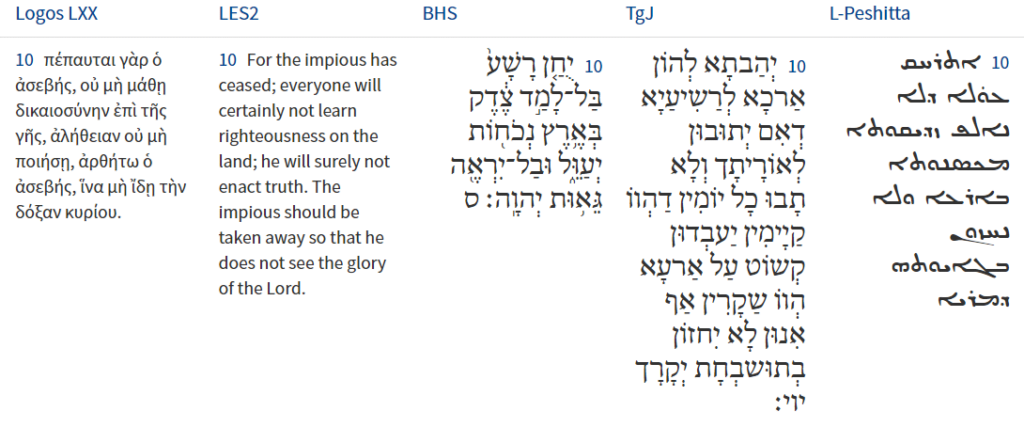
Here the LXX starts saying πέπαυται from the root word παυω pauō “make to cease, cease” and is translated in English as the impious. Here the LXX interprets Isaiah to say that the wicked, the impious will be removed, they will be taken away, and the reason is because they do not learn the righteousness of God. The TgJ translates “10 Thou hast granted unto the wicked continuance, that verily they should return to the law; but they did not return, all the days that they lived;—that they should practise truth in the earth, but they dealt falsely: yea, they will not regard the praise of thy glory, O Lord!” Note how the rabbinic interpretation recognizes that God is merciful from the sense of offering wicked repentance and return to His holy ways. We note the NT outcome that God also offers repentance to the Gentiles as well through faith in Yeshua God’s Messiah! The reason the NT account is true is because “the wicked” is a parallel for “the nations of the earth,” which may be found in Tehillim / Psalms 9:18 [English 9:17].
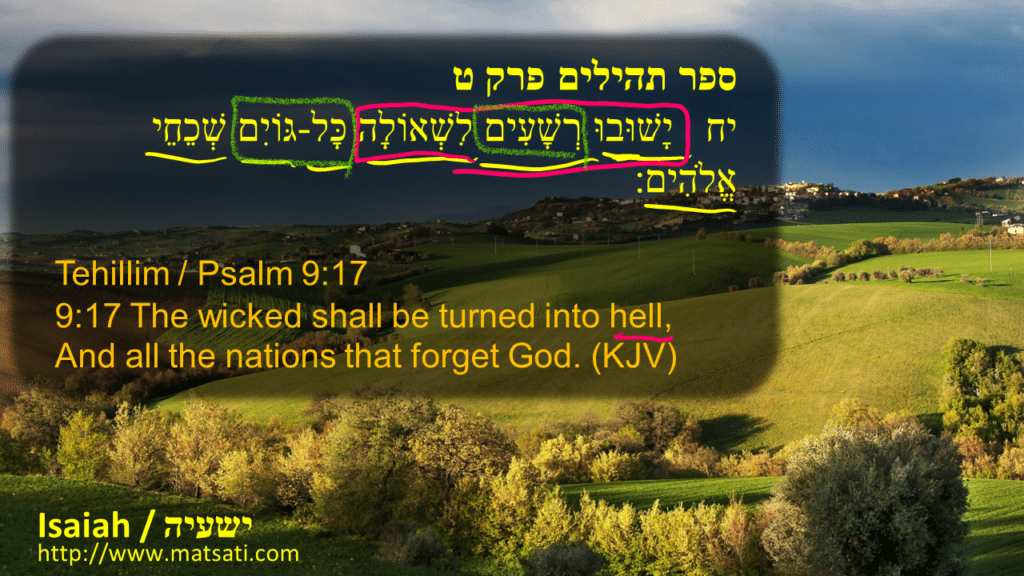
ספר תהילים פרק ט
יח יָשׁוּבוּ רְשָׁעִים לִשְׁאוֹלָה כָּל-גּוֹיִם שְׁכֵחֵי אֱלֹהִים:
Tehillim / Psalm 9:17
9:17 The wicked shall be turned into hell, And all the nations that forget God. (KJV)
Here we find a parallel with the wicked (רְשָׁעִים) and the nations (כָּל-גּוֹיִם). We note that this reveals the mercy of God, His judgments how He causes one to undergo certain circumstances in one’s life, which should have the effect of repentance. Circumstances change people, the way we live our lives, it changes us, and this is another aspect of the importance of walking in God’s holy ways according to His Torah! We also note that these things, the judgments are meant for the bringing down of the proud. Pride has a detrimental effect upon faith, and illustrates the importance of humility before God. Isaiah tells us that pride will receive its just reward! And the Torah states that when one receives the consequences of their prideful actions, only then are they able to see the truth (Devarim / Deuteronomy 8:3, 8:12-14). Note the significance of these Torah references:
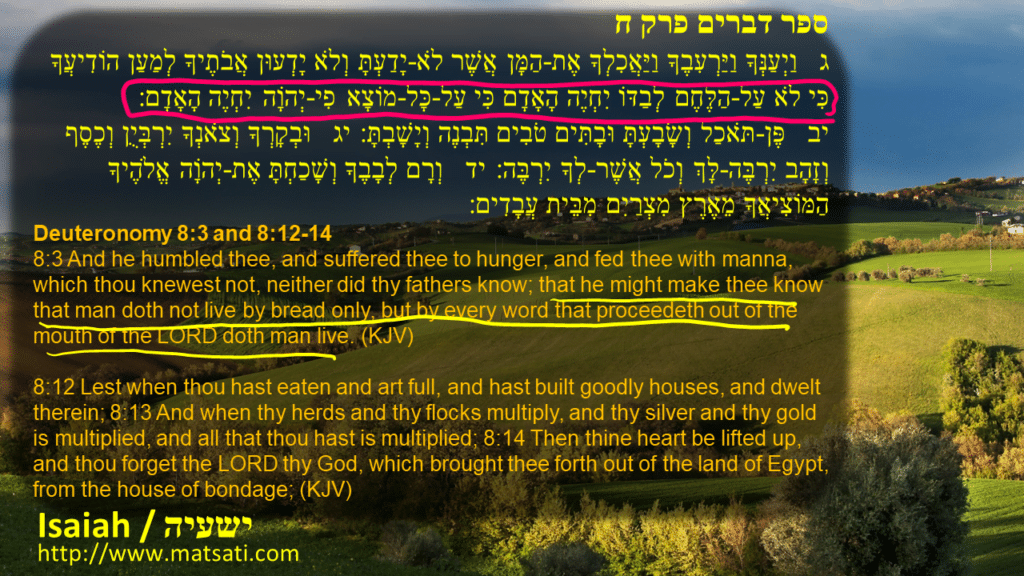
ספר דברים פרק ח
ג וַיְעַנְּךָ וַיַּרְעִבֶךָ וַיַּאֲכִלְךָ אֶת-הַמָּן אֲשֶׁר לֹא-יָדַעְתָּ וְלֹא יָדְעוּן אֲבֹתֶיךָ לְמַעַן הוֹדִיעֲךָ כִּי לֹא עַל-הַלֶּחֶם לְבַדּוֹ יִחְיֶה הָאָדָם כִּי עַל-כָּל-מוֹצָא פִי-יְהוָֹה יִחְיֶה הָאָדָם:
יב פֶּן-תֹּאכַל וְשָֹבָעְתָּ וּבָתִּים טֹבִים תִּבְנֶה וְיָשָׁבְתָּ: יג וּבְקָרְךָ וְצֹאנְךָ יִרְבְּיֻן וְכֶסֶף וְזָהָב יִרְבֶּה-לָּךְ וְכֹל אֲשֶׁר-לְךָ יִרְבֶּה: יד וְרָם לְבָבֶךָ וְשָׁכַחְתָּ אֶת-יְהוָֹה אֱלֹהֶיךָ הַמּוֹצִיאֲךָ מֵאֶרֶץ מִצְרַיִם מִבֵּית עֲבָדִים:
Deuteronomy 8:3 and 8:12-14
8:3 And he humbled thee, and suffered thee to hunger, and fed thee with manna, which thou knewest not, neither did thy fathers know; that he might make thee know that man doth not live by bread only, but by every word that proceedeth out of the mouth of the LORD doth man live. (KJV)
8:12 Lest when thou hast eaten and art full, and hast built goodly houses, and dwelt therein; 8:13 And when thy herds and thy flocks multiply, and thy silver and thy gold is multiplied, and all that thou hast is multiplied; 8:14 Then thine heart be lifted up, and thou forget the LORD thy God, which brought thee forth out of the land of Egypt, from the house of bondage; (KJV)
The Torah warns against prosperity and how it has the potential to become prideful and cause one to turn from the Lord.
Isaiah goes on saying the following according to Isaiah 26:11.
ספר ישעיה פרק כו
יא יְהֹוָה רָמָה יָדְךָ בַּל-יֶחֱזָיוּן יֶחֱזוּ וְיֵבֹשׁוּ קִנְאַת-עָם אַף-אֵשׁ צָרֶיךָ תֹאכְלֵם:
Isaiah 26:11 states, “LORD, when thy hand is lifted up, they will not see: but they shall see, and be ashamed for their envy at the people; yea, the fire of thine enemies shall devour them. (יְהֹוָה רָמָה יָדְךָ בַּל-יֶחֱזָיוּן יֶחֱזוּ וְיֵבֹשׁוּ קִנְאַת-עָם אַף-אֵשׁ צָרֶיךָ תֹאכְלֵם)” We note what Isaiah is saying here, יְהֹוָה רָמָה יָדְךָ בַּל-יֶחֱזָיוּן “Lord when your hand is lifted up, they will not see” suggests that the Lord brings judgment upon both Israel and the nations for the purpose of drawing the people to faith. But here in Isaiah 26:11, those to whom the hand of the Lord is lifted, they will not see nor understand what is happening. The Lord then attempts to show the nations the prosperity and faithfulness of His people, which should also have the effect of drawing the nations to faith. Note how this is accomplished, through the Lord God delivering His people from the hand of their oppressors. Examples are in the Exodus, and in Babylon. In both of these instances, the Lord is merciful and gracious to the people to deliver them and bring them back into the Land which he had given to Abraham and his descendants forever. Note that Eretz Yisrael belongs to Israel, and this is because the Lord God Almighty has made a promise to Abraham. This is found in Bereshit / Genesis 13:15-17
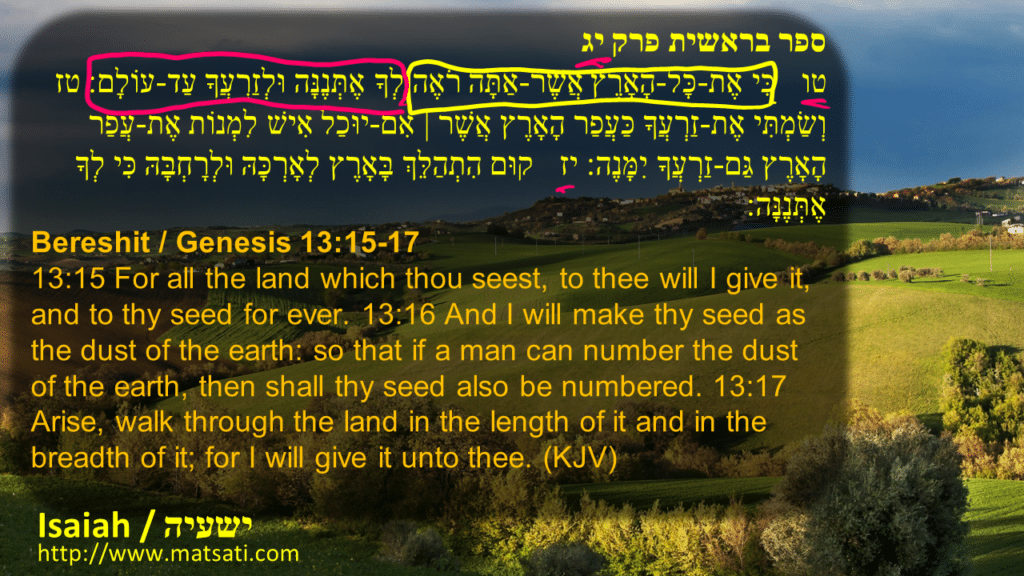
ספר בראשית פרק יג
טו כִּי אֶת-כָּל-הָאָרֶץ אֲשֶׁר-אַתָּה רֹאֶה לְךָ אֶתְּנֶנָּה וּלְזַרְעֲךָ עַד-עוֹלָם: טז וְשַֹמְתִּי אֶת-זַרְעֲךָ כַּעֲפַר הָאָרֶץ אֲשֶׁר | אִם-יוּכַל אִישׁ לִמְנוֹת אֶת-עֲפַר הָאָרֶץ גַּם-זַרְעֲךָ יִמָּנֶה: יז קוּם הִתְהַלֵּךְ בָּאָרֶץ לְאָרְכָּהּ וּלְרָחְבָּהּ כִּי לְךָ אֶתְּנֶנָּה:
Bereshit / Genesis 13:15-17
13:15 For all the land which thou seest, to thee will I give it, and to thy seed for ever. 13:16 And I will make thy seed as the dust of the earth: so that if a man can number the dust of the earth, then shall thy seed also be numbered. 13:17 Arise, walk through the land in the length of it and in the breadth of it; for I will give it unto thee. (KJV)
This is an expression of authority that God is stating here, as the Creator, He has given Abraham and his descendents permanent ownership of the Land of Canaan. The expression רָמָה יָדְךָ “your hand lifted” is also an expression of authority and imminent judgment. (See Bereshit / Genesis 17:11, 2 Samuel 24:16, Tehillim / Psalms 89:18 [English 89:17]) The Lord God loves His people, and when we realize this, out faith is increased, and when the nations realized this they become ashamed, just as Isaiah writes, יֶחֱזוּ וְיֵבֹשׁוּ “and they will see and they will be ashamed.” We note that the word יֶחֱזוּ is used here for “see” and this provides us a context of seeing as in a vision, suggesting the nations who see are are ashamed, this is something of God’s doing in their lives. Isaiah 26:11 concludes saying, אַף-אֵשׁ צָרֶיךָ תֹאכְלֵם “the fire of thine enemies shall consume them.” A text comparison shows the following:
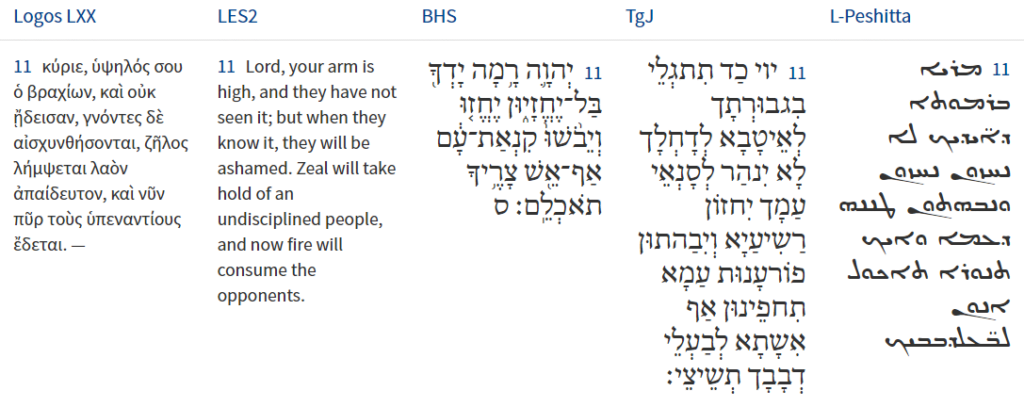
The Greek text is full of accusatives καὶ νῦν πῦρ τοὺς ὑπεναντίους ἔδεται “and fire will consume the opponents.” We note that ἔδεται “to consume/eat” is written in the future middle indicative, so this event has not happened yet, and there yet remains a chance for repentance. A demonstration of God’s mercy towards the nations too. The TgJ writes, “11 O Lord, when thou shalt be revealed in thy power to do good to them that fear thee, there will be no light to the enemies of thy people: the wicked shall see it and shall be confounded. The vengeance of thy people shall cover them; yea, fire shall consume thy enemies.” The rabbinic translation of Isaiah draws in a Torah concept of the Lord providing light to Israel, while keeping the enemy in total darkness! (Note the Exodus story, various occasions this happens, during the plagues of Egypt and while the army of Egypt was following Israel.) The application of these things for our lives today, is related to not keeping a rebellious heart towards the Lord and His Word. When one maintains rebellion, which is synonymous to turning from God’s Torah (instructions) the outcome is bleak, especially when one relies upon oneself. The outcome is shame once one realizes that faithfulness should have been in the Lord!
Isaiah continues saying the following according to Isaiah 26:12-14.
ספר ישעיה פרק כו
יב יְהֹוָה תִּשְׁפֹּת שָׁלוֹם לָנוּ כִּי גַּם כָּל-מַעֲשֵֹינוּ פָּעַלְתָּ לָּנוּ: יג יְהֹוָה אֱלֹהֵינוּ בְּעָלוּנוּ אֲדֹנִים זוּלָתֶךָ לְבַד-בְּךָ נַזְכִּיר שְׁמֶךָ: יד מֵתִים בַּל-יִחְיוּ רְפָאִים בַּל-יָקֻמוּ לָכֵן פָּקַדְתָּ וַתַּשְׁמִידֵם וַתְּאַבֵּד כָּל-זֵכֶר לָמוֹ:
Isaiah 26:12 states, “LORD, thou wilt ordain peace for us: for thou also hast wrought all our works in us. (יְהֹוָה תִּשְׁפֹּת שָׁלוֹם לָנוּ כִּי גַּם כָּל-מַעֲשֵֹינוּ פָּעַלְתָּ לָּנוּ)” Isaiah 26:13 “O LORD our God, other lords beside thee have had dominion over us: but by thee only will we make mention of thy name. (יְהֹוָה אֱלֹהֵינוּ בְּעָלוּנוּ אֲדֹנִים זוּלָתֶךָ לְבַד-בְּךָ נַזְכִּיר שְׁמֶךָ)” Isaiah 26:14 “They are dead, they shall not live; they are deceased, they shall not rise: therefore hast thou visited and destroyed them, and made all their memory to perish. (מֵתִים בַּל-יִחְיוּ רְפָאִים בַּל-יָקֻמוּ לָכֵן פָּקַדְתָּ וַתַּשְׁמִידֵם וַתְּאַבֵּד כָּל-זֵכֶר לָמוֹ)” These verses speak to expressing the confidence that God’s people have in Him! We are all dependent upon the Lord God in heaven, for peace, for truth, to help us turn from sin. Isaiah says אֲדֹנִים זוּלָתֶךָ לְבַד-בְּךָ נַזְכִּיר שְׁמֶךָ “Lord in you alone we will remember your name.” Note here אֲדֹנִים Adonim is written in the plural, which is an example of the plurality of respect. These things establish that it is the Lord God who can do all things, Isaiah expresses faith that God can establish peace through the declaration of His holy Word in the lives of His people. We note something that Peter wrote according to 1 Peter 3:10-12.
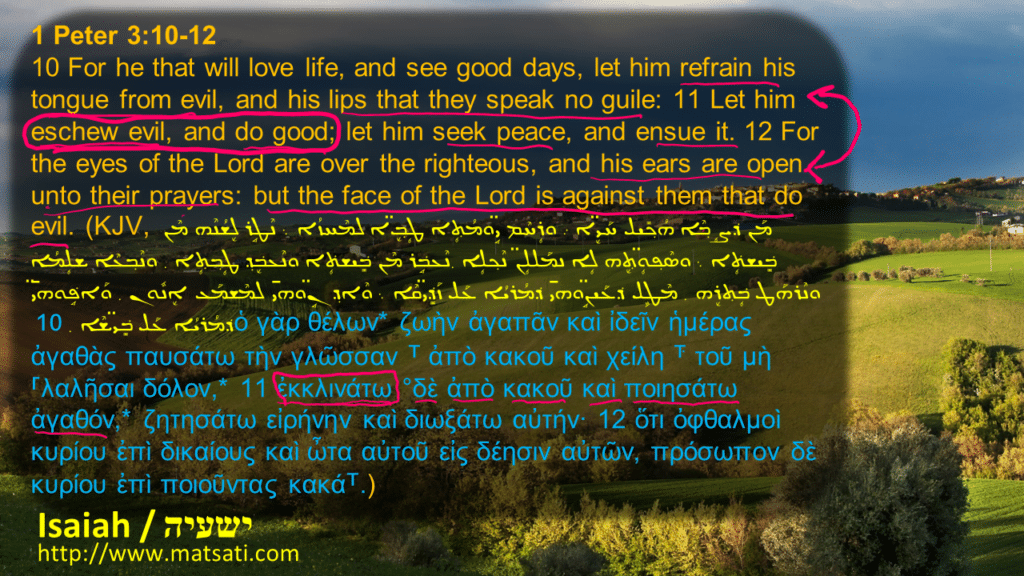
1 Peter 3:10-12
10 For he that will love life, and see good days, let him refrain his tongue from evil, and his lips that they speak no guile: 11 Let him eschew evil, and do good; let him seek peace, and ensue it. 12 For the eyes of the Lord are over the righteous, and his ears are open unto their prayers: but the face of the Lord is against them that do evil. (KJV, ܡܰܢ ܕ݁ܨܴܒ݂ܶܐ ܗܳܟ݂ܺܝܠ ܚܰܝܷ̈ܐ ܇ ܘܪܴܚܶܡ ܝܱ̈ܘܡܳܬ݂ܴܐ ܛܴܒ݂ܷ̈ܐ ܠܡܶܚܙܳܐ ܆ ܢܶܛܱܪ ܠܷܫܳܢܶܗ ܡܶܢ ܒܻ݁ܝܫܬܴ݁ܐ ܆ ܘܣܶܦ݂ܘܴ̈ܬ݂ܷܗ ܠܴܐ ܢܡܰܠܠܴܢ̈ ܢܶܟ݂ܠܴܐ ܂ܢܶܥܒܱ݁ܪ ܡܶܢ ܒܻ݁ܝܫܬܴ݁ܐ ܘܢܶܥܒܷ݁ܕ݂ ܛܴܒ݂ܬ݂ܴܐ ܂ ܘܢܶܒ݂ܥܶܐ ܫܠܴܡܳܐ ܘܢܶܪܗܰܛ ܒܴ݁ܬ݂ܪܷܗ ܂ ܡܶܛܾܠ ܕ݁ܥܰܝܢܱ̈ܘܗ̄ܝ ܕ݁ܡܳܪܝܳܐ ܥܰܠ ܙܰܕܻ݁ܝ̈ܩܶܐ ܆ ܘܶܐܕ݂ܢܱ̈ܘܗ̄ܝ ܠܡܶܫܡܰܥ ܐܷܢܽܘܢ ܂ ܘܰܐܦܱ݁ܘܗ̄ܝ̈ ܕ݁ܡܳܪܝܳܐ ܥܰܠ ܒܻ݁ܝ̈ܫܶܐ ܂ 10 ὁ γὰρ θέλων* ζωὴν ἀγαπᾶν καὶ ἰδεῖν ἡμέρας ἀγαθὰς παυσάτω τὴν γλῶσσαν ⸆ ἀπὸ κακοῦ καὶ χείλη ⸇ τοῦ μὴ ⸀λαλῆσαι δόλον,* 11 ἐκκλινάτω °δὲ ἀπὸ κακοῦ καὶ ποιησάτω ἀγαθόν,* ζητησάτω εἰρήνην καὶ διωξάτω αὐτήν· 12 ὅτι ὀφθαλμοὶ κυρίου ἐπὶ δικαίους καὶ ὦτα αὐτοῦ εἰς δέησιν αὐτῶν, πρόσωπον δὲ κυρίου ἐπὶ ποιοῦντας κακά⸆.)
The HNT writes יָסוּר מֵרָע וְיַעֲשֶׂה–טוֹב “turn from evil and do good.” The Peshitta writes ܢܶܥܒܱ݁ܪ ܡܶܢ ܒܻ݁ܝܫܬܴ݁ܐ ܘܢܶܥܒܷ݁ܕ݂ ܛܴܒ݂ܬ݂ܴܐ “to cross over from evil and do good.” This is consistent with the Greek text which states ἐκκλινάτω °δὲ ἀπὸ κακοῦ καὶ ποιησάτω ἀγαθόν “stay away from evil and do good” we note that ἐκκλινάτω “to stay away” is an aorist active verb which provides the sense of something that is to be actively done continually, to stay away or turn from evil! We take particular note of 1 Peter 3:12 which states, 12 ὅτι ὀφθαλμοὶ κυρίου ἐπὶ δικαίους καὶ ὦτα αὐτοῦ εἰς δέησιν αὐτῶν, πρόσωπον δὲ κυρίου ἐπὶ ποιοῦντας κακά⸆ 12 For the eyes of the Lord are over the righteous, and his ears are open unto their prayers: but the face of the Lord is against them that do evil. (KJV) We note how consistent this assessment is that Peter is making with the descriptions of God according to all of the Tanakh and especially with Isaiah! The Lord stands against them that do evil! What does it mean that the face of the Lord is against them that do evil? Isaiah describes such person’s outcome saying according to Isaiah 26:14 מֵתִים בַּל-יִחְיוּ רְפָאִים בַּל-יָקֻמוּ לָכֵן פָּקַדְתָּ וַתַּשְׁמִידֵם וַתְּאַבֵּד כָּל-זֵכֶר לָמוֹ “They are dead, they shall not live; they are deceased, they shall not rise: therefore hast thou visited and destroyed them, and made all their memory to perish.” Isaiah says that death is reserved for those who pursue evil. Note that Life is for those who pursue righteousness, justice, and truth in the Lord! Human pride brings death and note that there is no memory of the prideful once they have passed ( וַתְּאַבֵּד כָּל-זֵכֶר לָמוֹ). The point of these things is to draw our attention to what the Lord has done in the lives of His people, and in the lives of the nation’s so many thousands of years ago. This draws us to a present-day reality, that we should not walk in the same paths as those who went before us, but that we should seek the path of righteousness and truth! The righteous and holy ways of God. The purpose of pursuing righteousness is for the sole purpose of bringing glory to the Name of the Lord God Almighty and to His Messiah Yeshua Forever!
Rabbinic Literature
The Targum Jonathan is an Aramaic and Rabbinic translation of the book of Isaiah and therefore is a very valuable resource for the study of the book of Isaiah.
תרגום יונתן בן עוזיאל אל ישעיה פרק כה:ח-יד
ח אַף לְאֹורַח דִינָך יוי סַבַרנָא לִשמָך וּלדוּכרָנָך חַמֵידַת נַפשַנָא׃ ט נַפשִי מְחַמְדָא לְצַלָאָה קֳדָמָך בְלֵיליָא אַף רוּחִי בִמעַי מְבָרְכָא לָך אְרֵי כְמָא דְדִינָך תָקְנִין לְאַרעָא קוּשטָא יִתאַלפוּן לְמַעְבַד דְדָיְרִין בְתֵבֵל׃ י יְהַבתָא לְהֹון אַרכָא לְרַשִיעַיָא דְאִם יְתוּבוּן לְאֹורָיתָך וְלָא תָבוּ כָל יֹומִין דַהְוֹו קַיָימִין יַעבְדוּן קְשֹוט עַל אַרעָא הְוֹו שַקָרִין אַף אִנוּן לָא יִחזֹון בְתוּשבְחָת יְקָרָך יוי׃ יא יוי כַד תִתגְלֵי בִגבוּרְתָך לְאֵיטָבָא לְדָחְלָך לָא יִנהַר לְסָנְאֵי עַמָך יִחזֹון רַשִיעַיָא וְיִבַהתוּן פֹורעָנוּת עַמָא תִחפֵינוּן אַף אִשָתָא לְבַעְלֵי דְבָבָך תְשֵיצֵי׃ יב יוי תַתקֵין שְלָמָא לַנָא אְרֵי בְכָל עִדָן חְסֹוך מֵחֹובַנָא אַת עָבֵיד עִמַנָא׃ יג יוי אְלָהַנָא שְלִיטוּ בַנָא עַמְמַיָא לְמִהוֵי עְלַנָא רִבֹונִין בָר מִנָך בְרַם בְמֵימְרָך אְנַחנָא רְחִיצִין בִשמָך אְנַחנָא מֹודַן׃ יד אִינוּן פָלְחִין לְמָיְתִין דְלָא יֵיחֹון לְגִיבָרֵיהֹון דְלָא יְקוּמוּן וּבכֵין כַד תַסעַר עְלֵיהֹון חֹובֵיהֹון וּתשֵיצֵינוּן וְתַבֵיד כָל דֻכרָנְהֹון׃
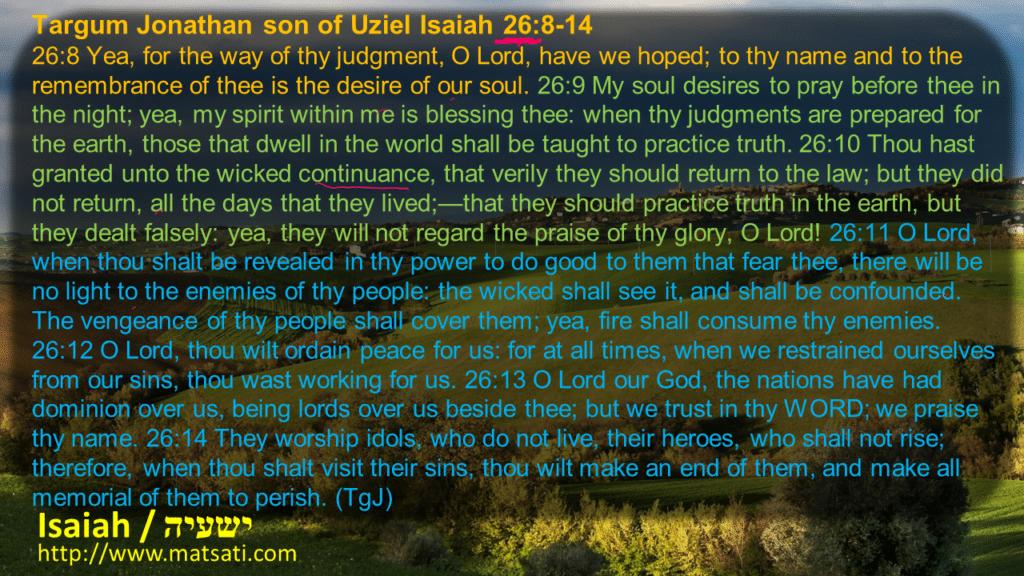
Targum Jonathan son of Uziel Isaiah 26:8-14
26:8 Yea, for the way of thy judgment, O Lord, have we hoped; to thy name and to the remembrance of thee is the desire of our soul. 26:9 My soul desires to pray before thee in the night; yea, my spirit within me is blessing thee: when thy judgments are prepared for the earth, those that dwell in the world shall be taught to practice truth. 26:10 Thou hast granted unto the wicked continuance, that verily they should return to the law; but they did not return, all the days that they lived;—that they should practice truth in the earth, but they dealt falsely: yea, they will not regard the praise of thy glory, O Lord! 26:11 O Lord, when thou shalt be revealed in thy power to do good to them that fear thee, there will be no light to the enemies of thy people: the wicked shall see it, and shall be confounded. The vengeance of thy people shall cover them; yea, fire shall consume thy enemies. 26:12 O Lord, thou wilt ordain peace for us: for at all times, when we restrained ourselves from our sins, thou wast working for us. 26:13 O Lord our God, the nations have had dominion over us, being lords over us beside thee; but we trust in thy WORD; we praise thy name. 26:14 They worship idols, who do not live, their heroes, who shall not rise; therefore, when thou shalt visit their sins, thou wilt make an end of them, and make all memorial of them to perish. (TgJ)
We note how the TgJ opens with the people of God having hope for the judgment of God. ח אַף לְאֹורַח דִינָך יוי סַבַרנָא לִשמָך וּלדוּכרָנָך חַמֵידַת נַפשַנָא׃ 26:8 Yea, for the way of thy judgment, O Lord, have we hoped; to thy name and to the remembrance of thee is the desire of our soul. (TgJ) Here the rabbinic interpretation is the people of God having hope for the judgment of God. Does it seem odd that the people of God would hope for judgment? The way of judgment is connected to the way of righteousness. In the context of explaining what is being said here, we remember according to the book of Jude, he wrote concerning wicked men saying the following:
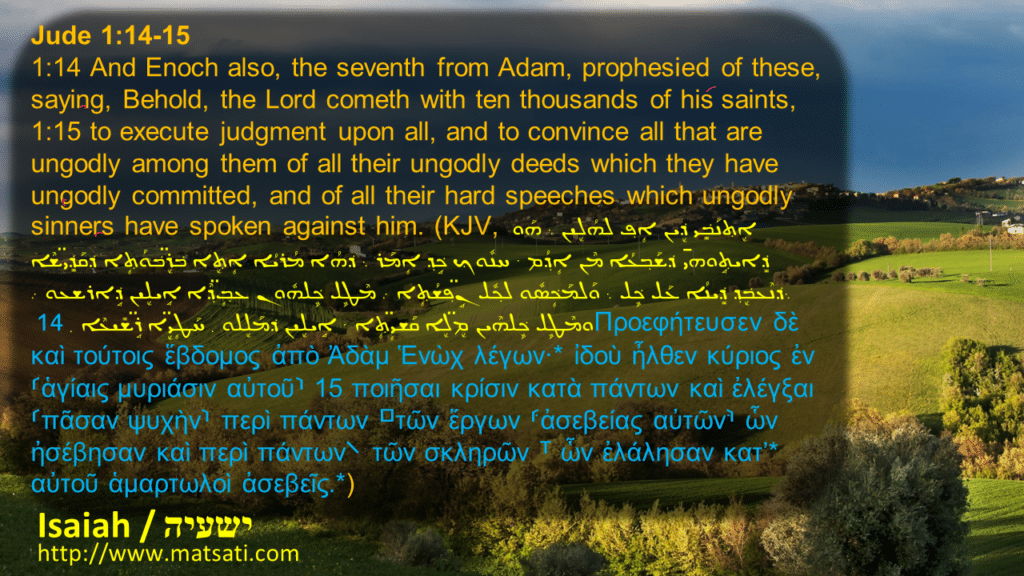
Jude 1:14-15
1:14 And Enoch also, the seventh from Adam, prophesied of these, saying, Behold, the Lord cometh with ten thousands of his saints, 1:15 to execute judgment upon all, and to convince all that are ungodly among them of all their ungodly deeds which they have ungodly committed, and of all their hard speeches which ungodly sinners have spoken against him. (KJV, ܐܷܬ݂ܢܰܒܻ݁ܝ ܕܷ݁ܝܢ ܐܴܦ݂ ܠܗܳܠܷܝܢ ܆ ܗܰܘ ܕܻ݁ܐܝܬ݂ܱܘܗ̄ܝ ܕ݁ܫܰܒ݂ܥܳܐ ܡܶܢ ܐܴܕ݂ܳܡ ܁ ܚܢܽܘܟ݂ ܟܱ݁ܕ݂ ܐܴܡܰܪ ܆ ܕ݁ܗܳܐ ܡܳܪܝܳܐ ܐܴܬ݂ܷܐ ܒ݁ܪܷ̈ܒ݁ܘܳܬ݂ܴܐ ܕ݁ܩܰܕܻ݁ܝ̈ܫܶܐ ܆ܕ݁ܢܶܥܒܷ݁ܕ݂ ܕܻ݁ܝܢܳܐ ܥܰܠ ܟܾ݁ܠ ܆ ܘܰܠܡܰܟܴ݁ܣܽܘ ܠܟ݂ܽܠ ܢܱ̈ܦ݂ܫܳܬ݂ܴܐ ܇ ܡܶܛܾܠ ܟܾ݁ܠܗܽܘܢ ܥܒ݂ܴ̈ܕ݂ܶܐ ܐܱܝܠܷܝܢ ܕܱ݁ܐܪܫܥܘ ܇ ܘܡܶܛܾܠ ܟܾ݁ܠܗܶܝܢ ܡܷ̈ܠܷܐ ܩܰܫܝܴ̈ܬ݂ܴܐ ܁ ܐܱܝܠܷܝܢ ܕ݁ܡܰܠܷܠܘ ܂ ܚܰܛܴܝܷ̈ܐ ܪܱ̈ܫܺܝܥܶܐ ܂ 14 Προεφήτευσεν δὲ καὶ τούτοις ἕβδομος ἀπὸ Ἀδὰμ Ἑνὼχ λέγων·* ἰδοὺ ἦλθεν κύριος ἐν ⸂ἁγίαις μυριάσιν αὐτοῦ⸃ 15 ποιῆσαι κρίσιν κατὰ πάντων καὶ ἐλέγξαι ⸂πᾶσαν ψυχὴν⸃ περὶ πάντων ⸋τῶν ἔργων ⸄ἀσεβείας αὐτῶν⸅ ὧν ἠσέβησαν καὶ περὶ πάντων⸌ τῶν σκληρῶν ⸆ ὧν ἐλάλησαν κατʼ* αὐτοῦ ἁμαρτωλοὶ ἀσεβεῖς.*)
Jude is explaining to us that all people face the judgment of God due to sin. We note that the judgment comes upon those who are among God’s people, those who choose to live godly lives. The explanation is coupled to the Torah and a prophecy from Enoch, which speaks to God instructing Adam and Eve giving them one command they were to keep. Only one command, a quite simple command, was simply not to eat from the tree of the knowledge of good and evil. They failed in their obedience. The Lord God Almighty Himself also reasoned with Cain telling him the following according to Bereshit / Genesis 4:7.
ספר בראשית פרק ד
ז הֲלוֹא אִם-תֵּיטִיב שְֹאֵת וְאִם לֹא תֵיטִיב לַפֶּתַח חַטָּאת רֹבֵץ וְאֵלֶיךָ תְּשׁוּקָתוֹ וְאַתָּה תִּמְשָׁל-בּוֹ:
Bereshit / Genesis 4:7
4:7 If thou doest well, shalt thou not be accepted? and if thou doest not well, sin lieth at the door. And unto thee shall be his desire, and thou shalt rule over him. (KJV)
The Lord warned that sin desires him and that as a man he is to rule over sin, not allow sin to rule over him. The idea is what Paul wrote to the Corinthians according to 1 Corinthians 9:27.
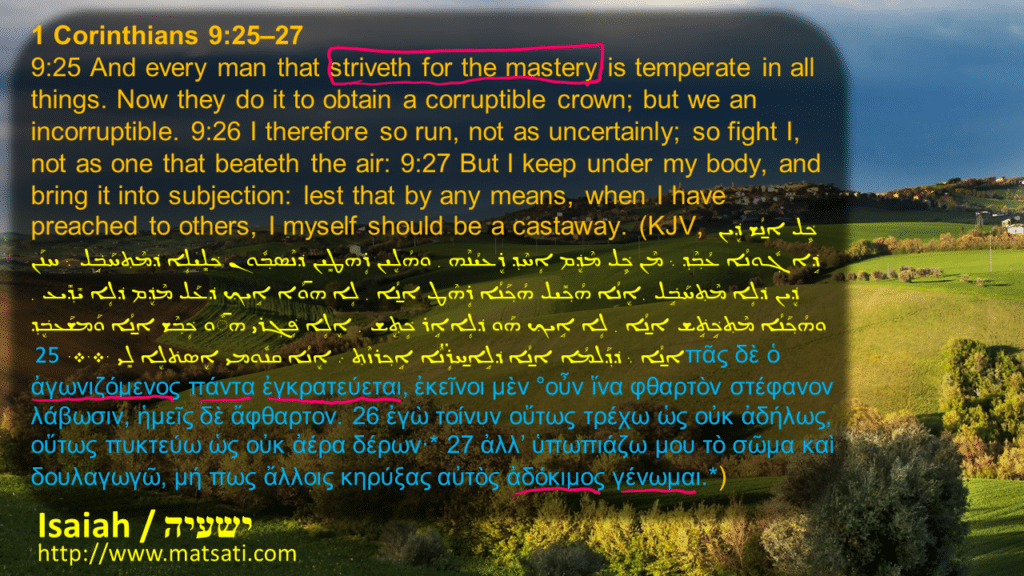
1 Corinthians 9:25–27
9:25 And every man that striveth for the mastery is temperate in all things. Now they do it to obtain a corruptible crown; but we an incorruptible. 9:26 I therefore so run, not as uncertainly; so fight I, not as one that beateth the air: 9:27 But I keep under my body, and bring it into subjection: lest that by any means, when I have preached to others, I myself should be a castaway. (KJV, ܟܾ݁ܠ ܐ̱ܢܳܫ ܕܷ݁ܝܢ ܕܱ݁ܐܓ݂ܽܘܢܳܐ ܥܳܒ݂ܶܕ݂ ܆ ܡܶܢ ܟܾ݁ܠ ܡܶܕܷ݁ܡ ܐܴܚܶܕ݂ ܪܷܥܝܳܢܶܗ ܂ ܘܗܳܠܷܝܢ ܪܴܗܛܻܝܢ ܕ݁ܢܶܣܒ݂ܽܘܢ ܟ݁ܠܻܝܠܴܐ ܕ݁ܡܶܬ݂ܚܰܒܱ݁ܠ ܆ ܚܢܰܢ ܕܷ݁ܝܢ ܕ݁ܠܴܐ ܡܶܬ݂ܚܰܒܱ݁ܠ ܂ܐܷܢܳܐ ܗܳܟ݂ܺܝܠ ܗܳܟ݂ܰܢܳܐ ܪܴܗܶܛ ܐ̱ܢܳܐ ܂ ܠܴܐ ܗ̄ܘܳܐ ܐܱܝܟ݂ ܕ݁ܥܰܠ ܡܶܕܷ݁ܡ ܕ݁ܠܴܐ ܝܺܕ݂ܺܝܥ ܂ ܘܗܳܟ݂ܰܢܳܐ ܡܶܬ݂ܟܱ݁ܬܱ݁ܫ ܐ̱ܢܳܐ ܂ ܠܴܐ ܐܱܝܟ݂ ܗܰܘ ܕ݁ܠܴܐܐܱܪ ܟܴ݁ܬ݂ܷܫ ܂ ܐܷܠܴܐ ܦܱ݁ܓ݂ܪܝ ܗ̄ܽܘ ܟܴ݁ܒ݂ܶܫ ܐ̱ܢܳܐ ܘܰܡܫܰܥܒܷ݁ܕ݂ ܐ̱ܢܳܐ ܆ ܕ݁ܕ݂ܰܠܡܳܐ ܐ̱ܢܳܐ ܕ݁ܠܱܐ̱ܚܪܴ̈ܢܶܐ ܐܱܟ݂ܪܙܶܬ݂ ܇ ܐܷܢܳܐ ܩܢܽܘܡܝ ܐܷܣܬ݁ܠܷܐ ܠܻܝ ܁܀܁܀܁ 25 πᾶς δὲ ὁ ἀγωνιζόμενος πάντα ἐγκρατεύεται, ἐκεῖνοι μὲν °οὖν ἵνα φθαρτὸν στέφανον λάβωσιν, ἡμεῖς δὲ ἄφθαρτον. 26 ἐγὼ τοίνυν οὕτως τρέχω ὡς οὐκ ἀδήλως, οὕτως πυκτεύω ὡς οὐκ ἀέρα δέρων·* 27 ἀλλʼ ὑπωπιάζω μου τὸ σῶμα καὶ δουλαγωγῶ, μή πως ἄλλοις κηρύξας αὐτὸς ἀδόκιμος γένωμαι.*)
Paul says ἀγωνιζόμενος πάντα ἐγκρατεύεται “competes for self-control,” the KJV translates this as “striveth for the mastery” is a comment on the olympic games. When reading this we get this idea of being very self-disciplined, similar to studying for a Masters of PhD degree, one must exercise a lot of self-discipline and give a lot of one’s time to achieve this goal. This is what is meant when Paul said that he keeps his body to bring it under subjection. The idea is that he is striving to overcome sin, to not commit sin, so that he would not be ἀδόκιμος γένωμαι disqualified from his place, which the KJV translates as “cast away.” This idea of being disqualified from one’s place is synonymous to sin bringing judgment. We note that the righteous look for the judgment of God, this is something that He does on behalf of His people, for the purpose of drawing back to paths of righteousness, truth, and faith. We also note that the Scriptures say God disciplines those He loves (Hebrews 12:6) so if one does not observe God’s discipline in his or her life, then one should consider what is his or her true intentions in matters of faith and faithfulness? Do I have true faith, a pure faith, and do I live faithfully to God’s Word? Ibn Ezra explains this verse from the TgJ in the following way:
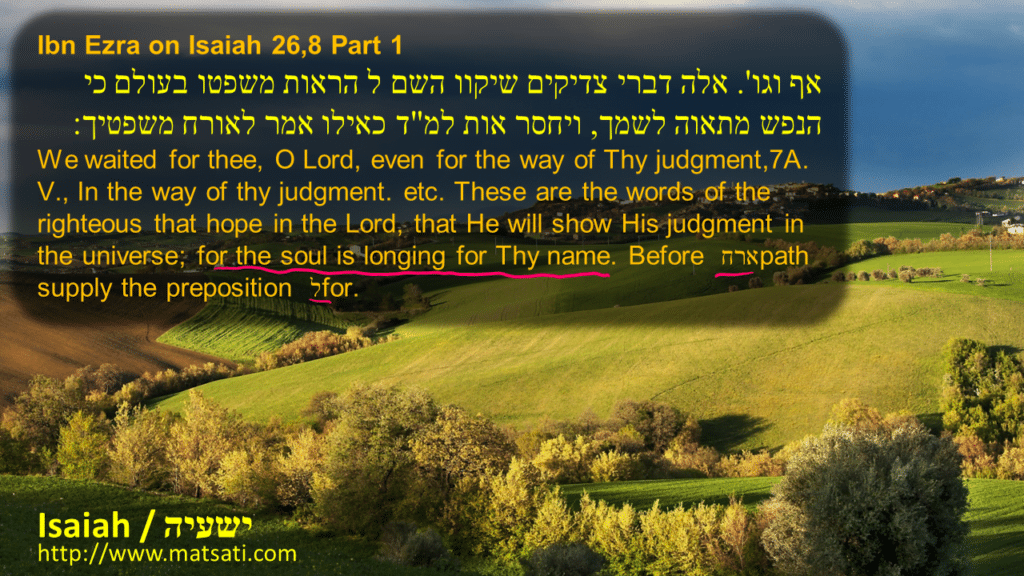
Ibn Ezra on Isaiah 26,8 Part 1
אף וגו’. אלה דברי צדיקים שיקוו השם ל הראות משפטו בעולם כי הנפש מתאוה לשמך, ויחסר אות למ”ד כאילו אמר לאורח משפטיך:
We waited for thee, O Lord, even for the way of Thy judgment,7A. V., In the way of thy judgment. etc. These are the words of the righteous that hope in the Lord, that He will show His judgment in the universe; for the soul is longing for Thy name. Before ארח path supply the preposition ל for.
Here Ibn Ezra writes that the righteous hope for the Lord, and that the Lord will show His judgment for their deliverance. It is unfortunate that mankind has been so unsuccessful to rule over their sinful desires. Paul wrote in Romans 3:23 “all have sinned and fall short of the glory of God” and that God is merciful providing a way for our sins to be forgiven. The point is that if we are unrepentant, it is indeed a fearful thing to fall into God’s hands (Hebrews 10:31). On the other hand, if we love God and serve Him, the Lord God Almighty promises to be merciful and compassionate just as we read according to the Torah in Devarim / Deuteronomy 32:36, כִּֽי־יָדִ֤ין יְהוָה֙ עַמֹּ֔ו וְעַל־עֲבָדָ֖יו יִתְנֶחָ֑ם כִּ֤י יִרְאֶה֙ כִּי־אָ֣זְלַת יָ֔ד וְאֶ֖פֶס עָצ֥וּר וְעָזֽוּב׃ “For the LORD shall judge his people, And repent himself for his servants, When he seeth that their power is gone, And there is none shut up, or left.” (KJV) Here the word יִתְנֶחָ֑ם means that He will have compassion on them, His servants, His people. This is the hope spoken of in Isaiah and is the hope that we have today as well!
Isaiah goes on saying the following, ט נַפשִי מְחַמְדָא לְצַלָאָה קֳדָמָך בְלֵיליָא אַף רוּחִי בִמעַי מְבָרְכָא לָך אְרֵי כְמָא דְדִינָך תָקְנִין לְאַרעָא קוּשטָא יִתאַלפוּן לְמַעְבַד דְדָיְרִין בְתֵבֵל׃ 26:9 My soul desires to pray before thee in the night; yea, my spirit within me is blessing thee: when thy judgments are prepared for the earth, those that dwell in the world shall be taught to practice truth. י יְהַבתָא לְהֹון אַרכָא לְרַשִיעַיָא דְאִם יְתוּבוּן לְאֹורָיתָך וְלָא תָבוּ כָל יֹומִין דַהְוֹו קַיָימִין יַעבְדוּן קְשֹוט עַל אַרעָא הְוֹו שַקָרִין אַף אִנוּן לָא יִחזֹון בְתוּשבְחָת יְקָרָך יוי׃ 26:10 Thou hast granted unto the wicked continuance, that verily they should return to the law; but they did not return, all the days that they lived;—that they should practice truth in the earth, but they dealt falsely: yea, they will not regard the praise of thy glory, O Lord! (TgJ) There is a lot going on here in the TgJ on Isaiah 26:9-10. Isaiah speaks of drawing near to the Lord through prayer at night, and of the spirit within blessing God when His judgments are prepared for the earth. The praise and blessing of the inward spirit is the result of the nation’s learning to practice truth and justice. In verse 10, Isaiah speaks of how God gives mercy to the wicked, the nations, for the purpose of turning from sin and returning to God’s holy and righteous ways. Those who are ungodly do not take this as an opportunity to repent and turn from their ways. The Talmud is a collection of sayings from the rabbis and offers at times insights and alternative approaches to the Scripture which help us to step outside of the box a little while studying the Scriptures. This is the major reason why I quote from the Talmud from time to time. The Talmud Bavli Megillah 6a has the following to say concerning these things:
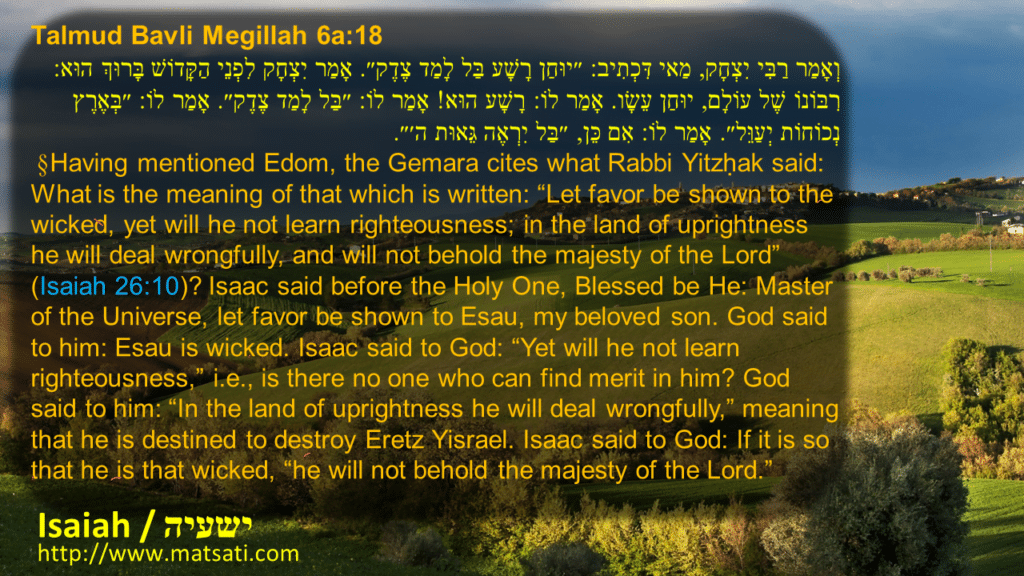
Talmud Bavli Megillah 6a:18
וְאָמַר רַבִּי יִצְחָק, מַאי דִּכְתִיב: ״יוּחַן רָשָׁע בַּל לָמַד צֶדֶק״. אָמַר יִצְחָק לִפְנֵי הַקָּדוֹשׁ בָּרוּךְ הוּא: רִבּוֹנוֹ שֶׁל עוֹלָם, יוּחַן עֵשָׂו. אָמַר לוֹ: רָשָׁע הוּא! אָמַר לוֹ: ״בַּל לָמַד צֶדֶק״. אָמַר לוֹ: ״בְּאֶרֶץ נְכוֹחוֹת יְעַוֵּל״. אָמַר לוֹ: אִם כֵּן, ״בַּל יִרְאֶה גֵּאוּת ה׳״
§ Having mentioned Edom, the Gemara cites what Rabbi Yitzḥak said: What is the meaning of that which is written: “Let favor be shown to the wicked, yet will he not learn righteousness; in the land of uprightness he will deal wrongfully, and will not behold the majesty of the Lord” (Isaiah 26:10)? Isaac said before the Holy One, Blessed be He: Master of the Universe, let favor be shown to Esau, my beloved son. God said to him: Esau is wicked. Isaac said to God: “Yet will he not learn righteousness,” i.e., is there no one who can find merit in him? God said to him: “In the land of uprightness he will deal wrongfully,” meaning that he is destined to destroy Eretz Yisrael. Isaac said to God: If it is so that he is that wicked, “he will not behold the majesty of the Lord.”
We note how this concept of mercy being given to the wicked is paralleled to Abraham and Esau, where Esau was shown great mercy, great blessing, and great wealth, and yet he rejected the word of God. These are the reasons why the Lord God brings calamity to the nations, and to His own, for the purpose of bringing man to his senses. When we are faced with our mortality, we begin to think more about the important things in life, what is going to happen when we die, etc, as opposed to the selfish things in life. Rashi points out something interesting about Esau in His commentary on Isaiah 26:10.
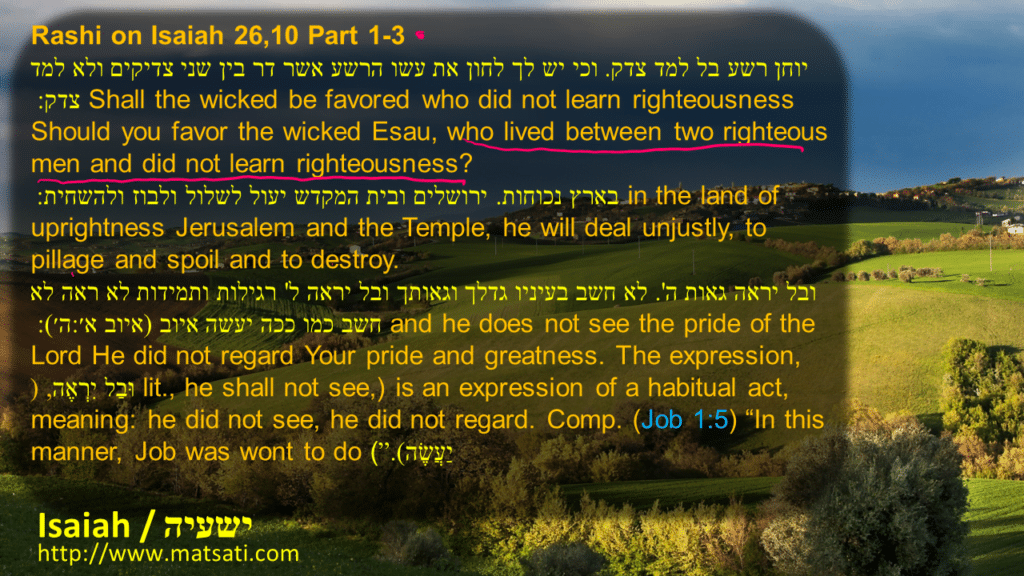
Rashi on Isaiah 26,10 Part 1-3
יוחן רשע בל למד צדק. וכי יש לך לחון את עשו הרשע אשר דר בין שני צדיקים ולא למד צדק: Shall the wicked be favored who did not learn righteousness Should you favor the wicked Esau, who lived between two righteous men and did not learn righteousness?
בארץ נכוחות. ירושלים ובית המקדש יעול לשלול ולבוז ולהשחית: in the land of uprightness Jerusalem and the Temple, he will deal unjustly, to pillage and spoil and to destroy.
ובל יראה גאות ה’. לא חשב בעיניו גדלך וגאותך ובל יראה ל’ רגילות ותמידות לא ראה לא חשב כמו ככה יעשה איוב (איוב א׳:ה׳): and he does not see the pride of the Lord He did not regard Your pride and greatness. The expression, וּבַל יִרְאֶה, (lit., he shall not see,) is an expression of a habitual act, meaning: he did not see, he did not regard. Comp. (Job 1:5) “In this manner, Job was wont to do (יַעֲשֶׂה).”
Rashi points out that Esau lived between two righteous men, and yet did not learn righteousness. Rashi also parallels וּבַל יִרְאֶה not seeing to the disregard to righteousness. In the Torah Portion Lech Lecha we are told that Abraham was counted righteous because he trusted in God’s promise for his life. (Bereshit / Genesis 15:6, וְהֶאֱמִ֖ן בַּֽיהוָ֑ה וַיַּחְשְׁבֶ֥הָ לֹּ֖ו צְדָקָֽה׃) The Hebrew word emunah אמונה is rendered “Faith” but comes from the word aman אמן “truth” which is the same word we obtain “amen” and here in the Torah, the first time this word appears in the Scriptures is here in Bereshit / Genesis 15:6. We are told וְהֶאֱמִ֖ן “and he believed” in HaShem and it was וַיַּחְשְׁבֶ֥הָ לֹּ֖ו צְדָקָֽה “counted to him as righteousness.” Abraham trusted completely in the Lord God in heaven and lived His life accordingly. It was his faith that caused him to be counted as righteous by God. (Note that he was childless, and yet he believed God would make him into a kingdom of people.) We note that even though one may live in a land of uprightness, and living in the midst of righteous people, this does not guarantee that a person will turn out to be faithful in the Lord. Abram accepted the truth of God’s word regardless of the circumstances that he found himself to be in. This is the kind of faith that the Lord God Almighty seeks from us, to believe in innocence and truth and purity of heart, just like a child believes his or her parents. These things reveal to us that we need to be intentional in our faith, we also need to strive for deeper faith. This requires God’s help, something we should ask for. All believers should have the desire to increase their faith. Paul wrote in 1 Corinthians 4:7 saying, “What makes you better than anyone else? What do you have that God hasn’t given you? And if all you have is from God, why boast as though you have accomplished something on your own?” The idea here is that all things have been given by God, including our faith, and so we seek Him for the increase. Paul wrote that increasing faith comes by way of being immersed in God’s Word (Romans 10:17, 1 Peter 2:2) and that the only thing that we can truly trust in is in what the Lord God Almighty will never fail us. (Hebrews 13:5). We note that trials come to not just test our faith but to make us stronger. Honor comes to those who stand strong and do not waver in their faith no matter what one is faced with in life!
Isaiah goes on saying, יא יוי כַד תִתגְלֵי בִגבוּרְתָך לְאֵיטָבָא לְדָחְלָך לָא יִנהַר לְסָנְאֵי עַמָך יִחזֹון רַשִיעַיָא וְיִבַהתוּן פֹורעָנוּת עַמָא תִחפֵינוּן אַף אִשָתָא לְבַעְלֵי דְבָבָך תְשֵיצֵי׃ 26:11 O Lord, when thou shalt be revealed in thy power to do good to them that fear thee, there will be no light to the enemies of thy people: the wicked shall see it, and shall be confounded. The vengeance of thy people shall cover them; yea, fire shall consume thy enemies. יב יוי תַתקֵין שְלָמָא לַנָא אְרֵי בְכָל עִדָן חְסֹוך מֵחֹובַנָא אַת עָבֵיד עִמַנָא׃ 25:12 O Lord, thou wilt ordain peace for us: for at all times, when we restrained ourselves from our sins, thou wast working for us. יג יוי אְלָהַנָא שְלִיטוּ בַנָא עַמְמַיָא לְמִהוֵי עְלַנָא רִבֹונִין בָר מִנָך בְרַם בְמֵימְרָך אְנַחנָא רְחִיצִין בִשמָך אְנַחנָא מֹודַן׃ 26:13 O Lord our God, the nations have had dominion over us, being lords over us beside thee; but we trust in thy WORD; we praise thy name. יד אִינוּן פָלְחִין לְמָיְתִין דְלָא יֵיחֹון לְגִיבָרֵיהֹון דְלָא יְקוּמוּן וּבכֵין כַד תַסעַר עְלֵיהֹון חֹובֵיהֹון וּתשֵיצֵינוּן וְתַבֵיד כָל דֻכרָנְהֹון׃ 26:14 They worship idols, who do not live, their heroes, who shall not rise; therefore, when thou shalt visit their sins, thou wilt make an end of them, and make all memorial of them to perish. (TGJ) We note the Torah perspective on Isaiah 26:11, the enemy has no light, while God’s people have light. In addition, peace is said to be ordained by God and the people of God give praise to the name of God regardless of whether there are people lording over them, or not. The outcome is that idol worshipers will end in being totally forgotten. This means that their work, all of their efforts, will be forgotten! Rashi interprets these things saying the following:
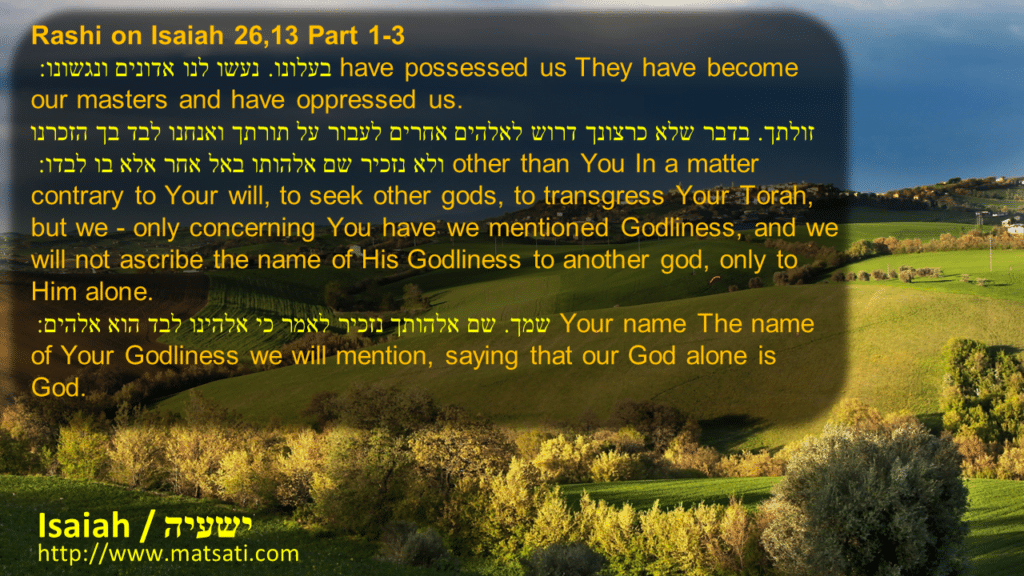
Rashi on Isaiah 26,13 Part 1-3
בעלונו. נעשו לנו אדונים ונגשונו: have possessed us They have become our masters and have oppressed us.
זולתך. בדבר שלא כרצונך דרוש לאלהים אחרים לעבור על תורתך ואנחנו לבד בך הזכרנו ולא נזכיר שם אלהותו באל אחר אלא בו לבדו: other than You In a matter contrary to Your will, to seek other gods, to transgress Your Torah, but we – only concerning You have we mentioned Godliness, and we will not ascribe the name of His Godliness to another god, only to Him alone.
שמך. שם אלהותך נזכיר לאמר כי אלהינו לבד הוא אלהים: Your name The name of Your Godliness we will mention, saying that our God alone is God.
Rashi comments that those who seek god’s other are transgressing the will of God because they transgress God’s Torah. In addition to this, God’s people will only ascribe the Name of God to the One and only God, the Creator God, the Almighty One! It is interesting when we study the whole pantheon of Ugarit where “El” was their “chief god.” The name of the Canaanite chief god is so close in pronunciation to Israel’s God. It is possible that HaNakhash (the Serpent, Satan) invented this in order to confuse and seduce Israel. here goes a conversation with a Cannanite proposed by Rabbi Jeremiah on Telegram:
Israeli #1: Hey do you worship El too?
Canaanite #1: yes he is the ‘god over all other gods’ Come worship him together with us
Israeli #1: ‘Cool! Let’s go!’ End scene.
It is interesting here in Israel theology, that the YHVH (HaShem), the One true God, is the One who rules over all! There were great dangers to having neighbors who would lead the people astray like this. Again, this illustrates why Israel was to remove all semblance of worship, idolatry, and people from their holy land! Both Ein Yaakov and Rashi speak to the significance of God’s Word in this aspect of the text.
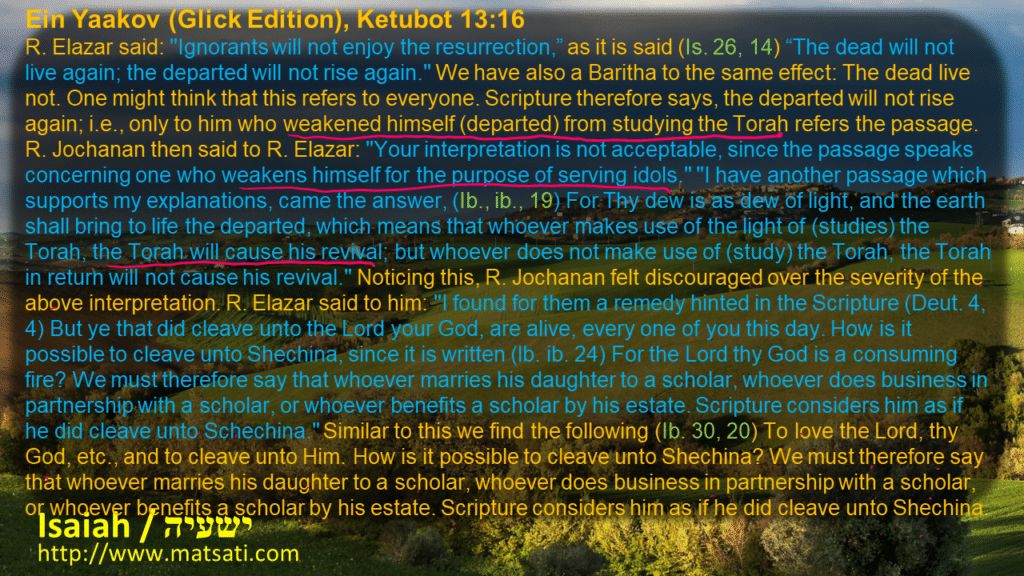
Ein Yaakov (Glick Edition), Ketubot 13:16
R. Elazar said: “Ignorants will not enjoy the resurrection, as it is said (Is. 26, 14) The dead will not live again; the departed will not rise again.” We have also a Baritha to the same effect: The dead live not. One might think that this refers to everyone. Scripture therefore says, the departed will not rise again; i.e., only to him who weakened himself (departed) from studying the Torah refers the passage. R. Jochanan then said to R. Elazar: “Your interpretation is not acceptable, since the passage speaks concerning one who weakens himself for the purpose of serving idols.” “I have another passage which supports my explanations, came the answer, (Ib., ib., 19) For Thy dew is as dew of light, and the earth shall bring to life the departed, which means that whoever makes use of the light of (studies) the Torah, the Torah will cause his revival; but whoever does not make use of (study) the Torah, the Torah in return will not cause his revival.” Noticing this, R. Jochanan felt discouraged over the severity of the above interpretation. R. Elazar said to him: “I found for them a remedy hinted in the Scripture (Deut. 4, 4) But ye that did cleave unto the Lord your God, are alive, every one of you this day. How is it possible to cleave unto Shechina, since it is written (lb. ib. 24) For the Lord thy God is a consuming fire? We must therefore say that whoever marries his daughter to a scholar, whoever does business in partnership with a scholar, or whoever benefits a scholar by his estate. Scripture considers him as if he did cleave unto Schechina.” Similar to this we find the following (Ib. 30, 20) To love the Lord, thy God, etc., and to cleave unto Him. How is it possible to cleave unto Shechina? We must therefore say that whoever marries his daughter to a scholar, whoever does business in partnership with a scholar, or whoever benefits a scholar by his estate. Scripture considers him as if he did cleave unto Shechina.
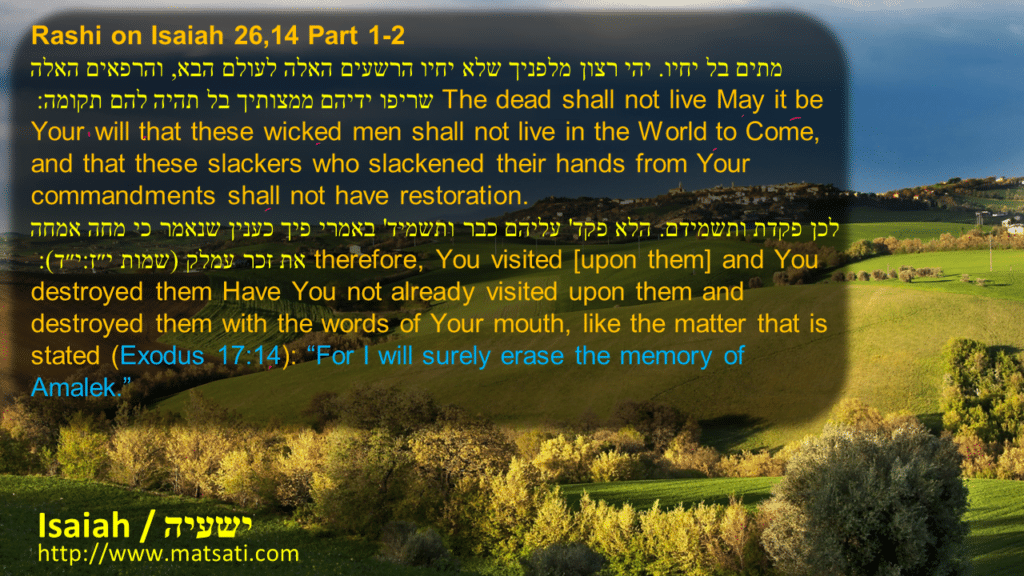
Rashi on Isaiah 26,14 Part 1-2
מתים בל יחיו. יהי רצון מלפניך שלא יחיו הרשעים האלה לעולם הבא, והרפאים האלה שריפו ידיהם ממצותיך בל תהיה להם תקומה: The dead shall not live May it be Your will that these wicked men shall not live in the World to Come, and that these slackers who slackened their hands from Your commandments shall not have restoration.
לכן פקדת ותשמידם. הלא פקד’ עליהם כבר ותשמיד’ באמרי פיך כענין שנאמר כי מחה אמחה את זכר עמלק (שמות י״ז:י״ד): therefore, You visited [upon them] and You destroyed them Have You not already visited upon them and destroyed them with the words of Your mouth, like the matter that is stated (Exodus 17:14): “For I will surely erase the memory of Amalek.”
Notice how both Rashi and Ein Yaakov speak to the significance of God’s Word as restoring the soul. In fact, God’s word is so powerful that it causes one to be able to participate in the resurrection of God! It is interesting how when one ceases the study of God’s holy Word, that one makes his or herself susceptible or weakened to be deceived by these things. Studying the Torah is described as a light to those who do so, and the forsaking of studying God’s word one will not have revival in his or her life! The reason these things work in this way is that those who are involved in studying God’s word are actively participating in cleaving to the presence (Shekhina) of God in their lives! We also note that the word of God destroys Evil! This is because the word of God leads one to righteousness and seeking the Lord God in heaven and his holy and righteous ways! These are the things that Yeshua taught us, to walk in His footsteps, and to walk in the light of God’s truth, to love God and to love our neighbors! All of these things destroy wickedness, when we consider matters of corruption, selfishness, and pride. These are the benefits of seeking the Lord God in heaven, and His Messiah!
